

FOZIA SALEEM


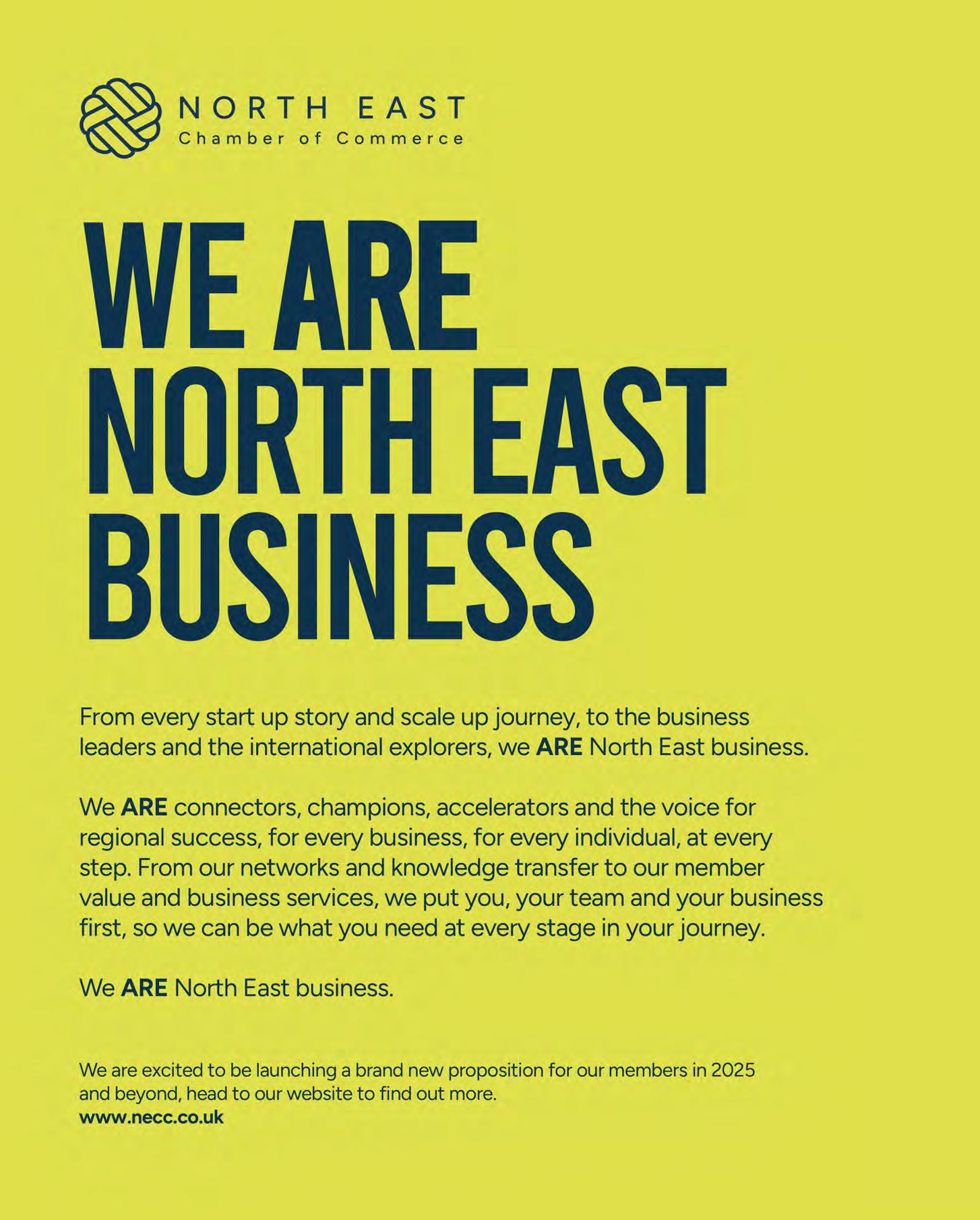

A powerhouse of opportunity
NET’s headline investment campaign
VISION 31 will return later this year to once again showcase the North East’s powerhouse business community to the City.

Talking Point
The Government unveiled its Small Business Plan over the summer, which came with promises of bold action to tackle late payments, a revamped board of trade to boost exports, moves to revive tired high streets and a £4 billion finance package aimed at helping firms start up and grow.
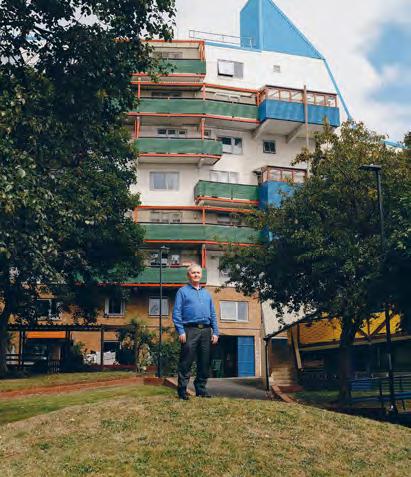

Five Minutes
Louise Doyle is chief executive of Mesma, the Newcastle-based technology organisation whose software helps education and employment support providers manage quality assurance processes.

CREDITS
HEAD OFFICE
The Stamp Exchange, 7 Westgate Road, Newcastle, NE1 1SA
All rights reserved. Reproduction, in whole or in part without written permission, is strictly prohibited.
CIRCULATION:
To confirm our circulation, please contact Chris Westwood, of Buxton Press, via chriswestwood@buxtonpress.com
To amend your mailing address or remove yourself from our mailing list contact hello@netimesmagazine.co.uk
CONTACT: @NETimesmagazine www.netimesmagazine.co.uk
PHOTOGRAPHY:
All photos taken by N staff are copyright North East Times Magazine Ltd, and are taken solely for use in N or products published by North East Times Magazine Ltd.
If you wish to use or publish a photograph taken for N, please contact pete@netimesmagazine.co.uk
Editor Steven Hugill steven@netimesmagazine.co.uk
Business journalist
Colin Young T: 07808 974 533 colin@netimesmagazine.co.uk
Bdaily digital content manager Peter Anderson peter.a@bdaily.co.uk
Business development director John Duns T: 07920 152 523 john@netimesmagazine.co.uk
Creative & managing director
Peter Mallon T: 07590 064 800 pete@netimesmagazine.co.uk


ADVERTISING CHARGES:
There is a £25 charge for every set of amendments, following the first initial set of amendments, which is free of charge for adverts designed by North East Times Magazine Ltd.
CANCELLATIONS:
If an advert is cancelled by the booker within a seven day period prior to our print deadline, the advert will be charged in full, plus VAT.
EDITORIAL:
Editorial must be received by the 9th of the month or no responsibility is accepted for errors. The opinions expressed in this issue are not necessarily the views held by North East Times Magazine Ltd.
ADVERTISEMENTS:
Although every care is taken to ensure accuracy, the publishers regret that they cannot accept responsibility for loss or damage caused by an error in the printing or damage to, loss of artwork, transparencies or photos.
COMPLAINTS:
Regarding advertisements will only be considered for up to a week after publication. Advertising must be received by the 12th of the month. No responsibility is accepted for errors.
Partnership & marketing manager Sarah Law sarah@netimesmagazine.co.uk
Digital marketing consultant Sian Anderson sian@netimesmagazine.co.uk
Finance manager Jill Brown jill@netimesmagazine.co.uk
Event managers Lesley Hampson lesley@netimesmagazine.co.uk
Dawn Owens dawn@netimesmagazine.co.uk
PRINT:
N is printed by Buxton Press Limited, the multi awardwinning printer based in Buxton, Derbyshire, which specialises in the sheetfed lithographic printing of magazines, brochures and programmes.
N is produced using vegetable-based inks combined with advanced innovative chemical-free plate and Heidelberg press technology and is printed on paper sourced from well-managed, sustainable forests.
Buxton Press is certified to ISO14001 and ISO9001 Standards, holds FSC® and PEFC Chain of Custody certification, offers Carbon Balancing via The World Land Trust and is currently working towards becoming a Carbon Balanced Printer.

Filmography Andrew Lowe andrew@netimesmagazine.co.uk
Paul Geist paul.geist.photo@gmail.com
Photography in this issue: Mike Sreenan www.michaelsreenan.com
Andrew Lowe andrew@netimesmagazine.co.uk
Jamie Haslam www.roamwithus.co.uk
Pawel Gajek www.thisisthebiggerpicture.co.uk
@2025 Published by North East Times Magazine Ltd.
Contributors:
Pamela Petty
Angela Carney
Nick Gholkar
Sam Whitehouse
Nicki Clark
Jennifer Rycroft
Louise Doyle
Mark Brassell
Lesley Spuhler






Editor’s word
As the summer period begins to fade from memory, Steven Hugill highlights how the sense of refreshment at this time of year is reflected throughout this issue…
Hello and welcome to the latest edition of N magazine.
How are you feeling after the summer period?
I don’t know about you, but this time of year always comes with a freshness and sense of renewal.
The sunshine holiday suitcases are once again packed away in the farthest corner of the loft, the children are back at school and those diary jobs asterisked in the pre-vacation haze are now looming large on the horizon.
So, as the meteorological calendar shifts, so too is it an opportunity to reset and refocus business goals.
And resetting the dial is central to the story behind Skye-Alexander Ferry and partner Amy-bosé Wilson.
Having painstakingly transformed a sprawling North Shields base –latterly home to Kasbah Furniture Market – into a mix of creative and wellness studios, hospitality venues and independent retail, bakery, restaurant and bar spaces, the couple know a thing or two about revitalisation.
Theirs is a story of passion, perseverance and proof that the right mix of imagination and ambition can not only breathe new life into an old building but also cultivate an entirely new community where collaboration has become an immediate constant.
The theme of fresh starts continues in our feature with cover star Fozia Saleem, chief executive at Sedgefield-based Magnitude Biosciences, which is using worms to lead the development of treatments for neurodegenerative diseases and drive new healthy ageing solutions.
From its origins in a modest garden shed, the business today stands at the forefront of its industry, with recent funding laying crucial foundations to deliver not just further scientific advances but new jobs across its County Durham team.
Elsewhere, we highlight the work of private equity and venture capital firm Maven, which, through its Female Founder Funding Programme, is helping refresh a capital support landscape so long tilted against women business owners’ ambitions.
We do so through an interview with England international cricketer Bess Heath, in the process highlighting another major resetting of the bar –the history-making Durham Women cricket team.
We also speak to Paul Fiddaman, chief executive of the Karbon Group, which, through its Karbon Homes, 54North Homes and Leazes Homes divisions, is adding fresh thrust to the social housing sector, not least thanks to the delivery of the first affordable housing in Newcastle’s Byker district for decades.
And we unveil the next iteration of our flagship investment campaign VISION 31, which will return to London in November to promote the region’s investable credentials to City audiences.
Having successfully held supporting events in Sunderland and Middlesbrough earlier this year, VISION 31 will present a refreshed blueprint to the capital’s financial district, which will emphasise the strength and breadth of its industry, and the additional catalysing potential afforded by the region’s devolution deals.
I hope you enjoy this issue.
Steven




NET’s flagship investment campaign is back –and bigger than ever.
VISION 31 returns in November with a London summit set to once again spotlight the North East as a powerhouse of opportunity.
Building on a hugely successful capital convention last year, and shaped by subsequent high-level Sunderland and Tees Valley events, VISION 31 will illuminate the North East’s role at the forefront of moves to nurture tomorrow’s world today.
Held at campaign partner Aon’s Leadenhall
Building global headquarters in the heart of London’s financial district, high-calibre panel discussions – featuring founders and business leaders whose ventures have flourished from the North East – will showcase the region’s fertile growth landscape to senior City figures and investment houses.
From the region’s mayoral-led regeneration bodies driving watershed economic and social change, to its ground-breaking manufacturers, pioneering green energy and digital moves, headline cultural developments, pulsing healthcare and life sciences ecosystem and thriving professional services landscape, the event will celebrate a region moving forward at pace.
NET is proudly working with a number of North East firms to deliver the summit, including headline partner Womble Bond Dickinson.
The campaign is also backed by partners Aon, Grand Central, Jackson Hogg and Lloyds Banking Group.
VISION 31 was conceived in the immediate post-pandemic period by NET alongside


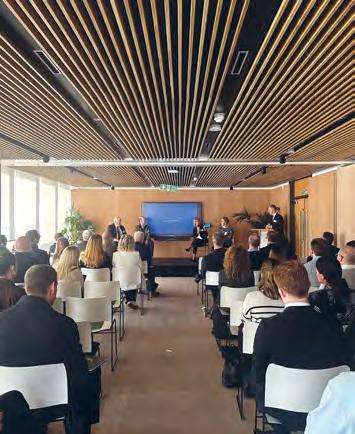
Newcastle-based Northstar Ventures to bolster investment into the region, with several roundtable discussions helping create a blueprint for change.
Steven Hugill, NET editor-in-chief, says: “We’re thrilled to be taking VISION 31 to the City again.
“The campaign is all about highlighting the North East’s enormous potential and the bold businesses driving its growth.
“The North East has arguably never been more dynamic, and VISION 31 gives senior City figures a front row seat to the innovation, ambition and resilience that defines our region.
“From trailblazing manufacturers to leading digital and green energy initiatives, the North East is bursting with opportunity, and VISION 31 is the perfect platform to bring that story to a wider audience.
“After the success of last year’s City event, we’re excited to build on that momentum and demonstrate to investors why the North East is a region worth backing.”
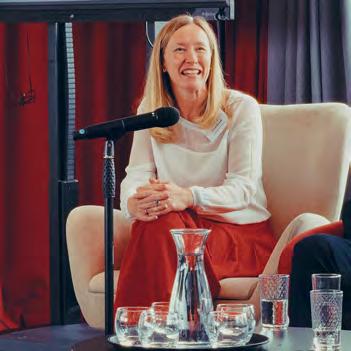
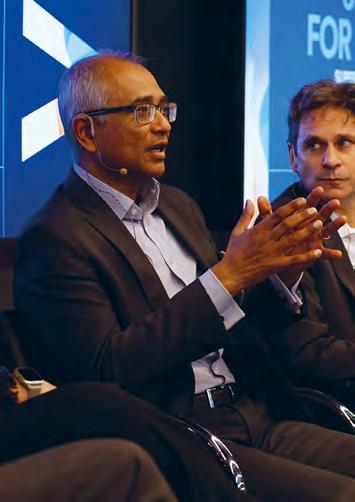
VISION 31
For more information about VISION 31, how your business could support the campaign and further details on the London summit, contact John Duns, NET business development director, by emailing john@netimesmagazine.co.uk
MAINTAINING THE MOMENTUM
A year on from relaunching national business news website Bdaily, multiplatform publisher NET is marking a successful 12 months while setting its sights on further growth. Here, Steven Hugill, NET editor-in-chief, reflects on the progress made and reveals how work is underway to drive even deeper audience engagement.
www.bdaily.co.uk | LinkedIn: Bdaily
From cranes reshaping its skyline to headline sporting achievements and pivotal political shifts, the North East has undergone marked transformation over the past year.
So too has multi-platform publisher NET. And nowhere is the change more palpable than across this very publication, which 12 months ago evolved from North East Times Magazine into N.
The move, supported by refreshed editorial content, design and photography, underscored NET’s ambitions to grow into a national publishing house of brands.
Allied to a powerful high-level events calendar – which includes the VISION 31 investment campaign and NET 250, which ranks the region’s top-performing businesses by turnover – the transformation to N has further bolstered NET’s reputation as a trusted, independent publisher that champions the North East’s commercial landscape.
An equally important chapter in its growth story has been Bdaily.
Acquired last year and relaunched in late September, the website is central to NET’s expansion strategy.
Having undergone a purposeful evolution, the platform now boasts a refreshed editorial approach, new people-led features, engaging columnists and a sharper commercial offer, which have driven notable growth, secured several new brand partnerships and markedly elevated Bdaily’s status in a competitive digital media landscape.
Since its revival, engagement has risen steeply across the website and sister social media output.
From the turn of 2025 to the present day, the site has garnered more than 2.5 million
page views.
Furthermore, demand for the digital platform’s daily email bulletins – which hit North East inboxes five times a week and are complemented by twice-weekly Yorkshire updates and a nationally-focused Wednesday service – continues to arc upwards.
From nearly 48,000 in October, total subscribers stood at more than 64,000 as this edition of N magazine went to print.
And the positive trajectory continues across social media, where Bdaily LinkedIn followers have nearly doubled to 13,000 and monthly impressions have jumped from less than 70,000 to more than 415,000.
Steven Hugill, NET editor-in-chief, says: “We’re absolutely delighted with the progress made by Bdaily over the last 12 months.
“The team has worked incredibly hard, with their endeavours reflected in the platform’s audience engagement figures.
“We’ve refined Bdaily’s editorial voice, launched new content platforms and refreshed our commercial offer, with the latter delivering tailored content that is increasingly resonating with clients keen to speak to a national audience.
“But we’re not standing still; we’re working on plans to further refine the platform and provide even greater news coverage and value for clients.
“We have great momentum as we head towards 2026, and are excited for what we can achieve.
“Watch this space.”
Bdaily
To find out more about Bdaily’s editorial offer, visit www.bdaily.co.uk
To learn how the platform can support your PR and commercial goals, email Sarah Law, Bdaily partnership and marketing manager, at sarah@bdaily.co.uk


A time for decisive action
By Steven Hugill

From another summer of protests under the banner of patriotism to a new skills partnership aiming to bolster the region’s learning landscape and Newcastle Falcons’ flight to the Red Bull sporting nest, Steven Hugill looks at some of the stories making the North East’s news agenda.
The rise of the Cross Brigade
Ah, the Great British Summer.
Sun, sea, sand. And sale sticker standards.
That’s right. A year after Great British Patriots looted Lush and cleaned out Crocs collections, they were back, gathered once again alongside fellow Bargain Battalion recruits to save their country in red, white and blue glory.
With cut-price Temu Union flags over their shoulders and fingers poised on scarlet spray can nozzles, nothing was safe from the Cross Brigade.
Mini roundabouts; meter boxes; road signs; cars; bins; bare brick walls; a clothing and shoe bank.
Even the lampposts got it.
Rows of Union and St George colours cable-tied three-quarters up poles – presumably the point where the loaned cherry picker couldn’t stretch any higher – streaked down roads in a scene fit for a services parade.
Except the forces were nowhere to be seen.
Pride in your country is one thing.
But when that loyalism becomes bastardised by bar room blather and Facebook-fuelled fallacies, it becomes an altogether different proposition.
And that’s the point we’ve reached (again).
The paint will chip and wash away, and the flags will fray and discolour as autumnal wind and rain turns to winter squalls.
But the performative fury will simmer on through the storms.
And to stop it bubbling over again next summer, the Government must finally act with clarity and certainty.
Which means going beyond immigration and its ongoing struggle with Reform’s rising ranks.
As N magazine went to print, Labour was attempting to stiffen regulations around refugee families and international students claiming asylum after visas expire.
But a regime that spent its first year like a pentimento painter must use its second stanza to be much more assertive.
It must venture where the Conservatives failed to visit in more than a decade and tackle
the economic malaise, the hollowed towns, the rising social housing lists, the vanishing community services and the overstretched healthcare system that have made the Cross Brigade feel empowered.
Because this summer – just like 2024 – was never solely about border crossings and headlines about hotels housing those in need.
It was a clear example of what happens when people feel left behind and ignored.
And if ministers don’t heed the warning, next summer will play out like the one just past: flags up, spray cans out and chaos made patriotic.
Boosting the skills agenda
The classrooms, lecture theatres and engineering halls may have fallen silent over the summer, but the region’s education sector nevertheless remained abuzz.
The noise came from the launch of Colleges for North East England, which bosses say “signals a new era of collaboration, ambition and action to address the region’s most pressing skills challenges and opportunities”.
Boasting combined assets of £433 million and more than 62,000 students, they add it will work with the North East Combined Authority to boost learning in high-growth sectors and drive new programmes aimed at tackling poverty.
In a world where employers continue to call for staff who can meet today’s demands while helping drive tomorrow’s industries, the body’s formation is more than welcome.
For too long, N magazine – through its roundtable events, panel discussions and interviews with multi-sector leaders – has reported on a fracture between education and the workplace, where a tangled relationship hasn’t truly benefited either.
Colleges for North East England, which, among others, includes Bishop Auckland College, Gateshead College, Newcastle College and Tyne Coast College, represents an opportunity to tangibly change that.
The fact the endeavour – which also includes the Education Partnership North East body that oversees Sunderland College, Northumberland College and Hartlepool Sixth Form – promises to work in harmony with the North East
Combined Authority, leaning into the promise of devolution, only augurs well too.
Of course, action must now be delivered, but with such alignment the foundations are in place to turn ambition into results.
If that momentum is sustained, then learners – and the region’s employers and economy –stand to gain in ways that will be felt for years to come.
Falcons gain their wiiings
It was hardly Alexander Isak-esque in the saga stakes, but Red Bull’s takeover of Newcastle Falcons nonetheless kept headline writers busy during rugby union’s off season.
The name might be divisive; Newcastle Red Bulls is about as saccharine as a can of its energy drink.
But pushing the semantics aside for a moment, the move – for a club that has languished at the foot of England’s top tier for too long –represents a great coup.
Crucially, it provides new-found belief that with Red Bull’s support, the club can not only climb the domestic ladder again but, to borrow the firm’s marketing spiel, gain wiiings to fly to the top table of European competition.
Naturally, there will be some sad to see their local club swallowed up by a global conglomerate, for whom success on the field will mean as much as points on the board as it will marketing exposure.
But the days of rags to riches tales are, sadly, few and far between in the world of elite sport these days.
And it is worth remembering the Falcons’ heyday came via fairy godfather Sir John Hall. So Red Bull’s arrival isn’t exactly a novel concept.
And with Newcastle United ending its trophy drought, Sunderland AFC back in the Premier League, Middlesbrough FC – at the time of writing – topping the Championship and the region’s women’s teams making their mark, from football sides to Durham Women’s first season in cricket’s elite, the Red Bull takeover presents a great opportunity to write another chapter in the region’s sporting success story.
QUESTION
B G
With international trade moves offset by contentious domestic tax hikes and headline policy reversals, the Government’s first year in power has been anything but smooth. How do you assess its performance to date, and what are the key priorities it must focus on in the months ahead to support the North East business community’s growth goals?

Pamela Petty Director
By Steven Hugill
The Government’s first year in office has highlighted the difficulty of aligning bold international trade ambitions with domestic economic pressures.
For the North East business community to thrive, its goals must reflect national economic priorities, which chiefly centre around building a stronger, more self-sufficient economy that supports opportunity, job creation and sustainable growth.
While progress has been made in skills development, digital inclusion and infrastructure planning, the fundamentals remain: we cannot fund opportunity without a healthy economy.
A key priority must be redressing the UK’s chronic trade imbalance.
This isn’t just about boosting exports; we must also reduce unnecessary imports by supporting domestic manufacturing and services through targeted subsidies or procurement strategies that favour UKbased providers.
The North East has a clear opportunity to lead in low-carbon innovation, skills and advanced manufacturing.
But this must be British-owned growth, retaining wealth in the region and reinvesting it in people and communities.
Foreign direct investment has a role to play, but not at the expense of long-term economic sovereignty.
The Government must also stop pitting regions against each other for funding or business; a collaborative, UK-wide strategy will deliver far greater economic value.
Above all, the focus must shift from short-term wins to building an economy capable of sustaining the outcomes we all want: education reform, better housing and secure, meaningful employment.

Angela Carney Managing director Carney Consultancy
At a time when so many sectors say they have a skills shortage, we seem to have two main pressing concerns.
The number of people in the 55 to 67 age group is far greater than the number of Gen Alpha and Gen Zs available for work.
So, at a time when companies should be hiring to ensure future generations are trained, there is a lack of work opportunities for young people.
Meanwhile, a recent article revealed 37 per cent of Gen Z have considered leaving their jobs, with 40 per cent citing concerns over mental health.
The Government needs to put more in place to help with mental health and wellbeing, as this is having a significant impact on a large percentage of the population, yet mental health services within the NHS are already oversubscribed with, in many cases, 12-month waiting lists.
Although all employers could do more, by offering employees access to the free support of counsellors and therapists, the Government could acknowledge this growing area of concern.
If we continue to ignore worries around a lack of skills, the gap will only become wider, and although artificial intelligence will replace jobs, it won’t fill the whole gap.
Furthermore, many companies seem to have put a freeze on recruiting due to the increase in national insurance.
So, if companies are not bringing through the next generation and actively trying to grow, what is the Government’s strategy for long-term sustainability?

Nick Gholkar Executive partner
Ward Hadaway
The Government’s first year has unfolded against a backdrop of economic turbulence and international uncertainty, which has inevitably shaped its domestic agenda.
For the North East, the focus now must be on working constructively to capitalise on the opportunities and comparative advantages we have as a region.
There have already been several encouraging developments –commitments to investment in infrastructure, the integration of the bus network and longer-term projects like the Metro extension and airport expansion.
These are critical enablers of development and help create the conditions for inward investment.
The Government’s priority should be ensuring funding is directed toward projects with broad regional impact.
Support for developments such as the Gateshead Quays conference centre, the Blyth data centre campus, transport and other infrastructure can drive growth across the leisure, retail and green sectors, while reinforcing the region’s strengths in renewable energy and new technologies.
This needs to be managed alongside environmental responsibilities and delivered through strong public and private sector collaboration.
We’re focused on enabling our clients across all sectors to contribute towards this strategy and bolster economic activity within our great region.
We need to move forward with positivity, and shout loudly about why we should be top of the priority list.
By doing so, we can help ensure the North East is seen as a region ready to deliver lasting impact.

Dr Sam Whitehouse Chief executive
The Government’s first year has been a step back for the life sciences sector –ambitious on paper, but underwhelming in practice.
While the Life Sciences Sector Plan boasts £2 billion in funding and bold goals to make the UK a global leader by 2035, the reality for North East companies is familiar: underinvestment, policy inconsistency and a widening North-South divide.
Coupled with inaction from grant bodies, many firms have been unable to leverage innovation grants against private finance. This leaves UK companies at a disadvantage to overseas peers, which benefit from greater support and, as a result, attract more investment.
Despite strong pharma growth in the North East over the past five years, 2025 has seen a sharp drop in health-related innovation funding compared to London and the South East.
Tax policy has added insult to injury.
The recent research and development tax relief changes make the UK uncompetitive compared to countries like France and Australia.
If the Government wants to be taken seriously, it must start recognising life sciences as a strategic asset. That means:
• Fixing the funding imbalance with targeted investment from British Business Bank
• Reforming research and development tax relief to reflect global collaboration
• Creating a dedicated North East life sciences investment office to support scale-ups
• Ensuring NHS procurement reforms reach regional SMEs
Until then, ambition will continue to outpace action.
Charting lifelong client success
ITC Service
www.itcservice.co.uk
LinkedIn: ITC Service
From fast-changing software platforms to ever-sharper cyber threats and the inexorable rise of artificial intelligence, the IT world is in constant flux. Providing clarity amid the change is ITC Service, whose powerful technology stack is keeping individuals and organisations connected, secure and ready for tomorrow’s world. Here, the Hebburn-based managed service provider’s founder and director Christopher Potts tells Steven Hugill about the company’s comprehensive service, its client-first ethos and its plans for expansion.

Anchored in a circular gravel drydock, a miniature metal yacht shimmers in the summer sunshine.
Its mainsail bends against an invisible breeze as a golden orb crowns its mast, casting a perpetual glow for a lone wayfinder above its bow.
Set inside a grass bordered mini-roundabout on Hebburn’s Monkton Business Park South, THE FAR HORIZON, as spelled out by golden letters on its rear, stands as a neat metaphor for surrounding businesses seeking the commercial lands of tomorrow.
For ITC Service, the craft, which rests just yards from its main entrance, embodies its very existence.
From IT hardware and connectivity to cloud services support, telephony and cybersecurity, the company acts as a modern-day draughtsman, crafting blueprints that steer clients toward new trading landmarks.
“We provide a total support solution that solves headaches and pains, and creates continuity for businesses to maintain operations,” says Christopher Potts, ITC Service’s founder and director.
“A manufacturer makes a widget; a law firm defends a client; a construction firm creates a building – and they do those things very well.
“But they’re not an IT firm, and that is why our support is so valuable.
“Using our core values of integrity, trust, communication and service, we help clients fully leverage products like Microsoft 365, to ensure they are making the most of their investments.
“We also provide trusted connectivity services.
“Whether a firm is employing ten, 100 or 600 staff, it needs its people to stay productive.
“And our advanced technology and expert team monitors around the clock so they can do that safely.
“Our support also helps clients understand the benefits of planning and investing now, rather than waiting for apparatus to potentially fail.
“We make those conversations relatable, around areas like action plans if a laptop doesn’t start on a morning.
“A company’s IT department might buy a device and prepare it for employee use – but it’s going to lose at least a day’s work, it will carry costs and it will put stress on the employee too.”
Such conversations, says Christopher, are indicative of ITC Service’s deep-rooted commitment to clients’ sector-specific and operational circumstances.
Like the rust-patinaed Angel of the North, which guards over all who pass its outstretched wings just a short drive from ITC Service’s office, the firm is a constant custodian of organisations and their everyday wellbeing.
Christopher says: “There isn’t another managed service provider that fits our shape.
“We take a client-centric approach, which allows us to find the right angles to keep them safe and operational.
“We build lifelong relationships – we rarely lose a client,” says Christopher, who began his working life as a practice-based accountant before co-founding ITC Service with Peter Anderson after being struck by the “magic” of the mid-2000s burgeoning tech sector.

He adds: “A significant part of our success is down to our value-based pyramid, which, when combined with honest conversations, allows clients to make informed decisions about our technology stack.”
That powerhouse portfolio is being increasingly fortified by a dedicated cybersecurity offer.
Central planks in the endeavour are ITC Service’s IASME accreditation to deliver the Government-backed Cyber Essentials certification scheme, and a tiered package that suits clients’ varying operational and budgetary demands.
Its entry-level SecureStart cover includes services such as Microsoft 365 tenancy management and backup, device patching and email filtering, with its SecureAware suite adding functions such as vulnerability scanning, phishing simulation and security awareness training.
Its gold-level SecureComplete platform builds on those measures with actions including dark web monitoring, a Sophos breach warranty and free Cyber Essentials level one coverage.
All three are underpinned by a UK-first move alongside the Home Office-funded monitoring tool Police CyberAlarm, wherein ITC Service harnesses the apparatus’ technology to respond to alerts – without client intervention –and take immediate steps to manage detected vulnerabilities and risks.
Christopher says: “We take cybersecurity very seriously.
“I’ve seen the devastating effect of an employee
accidentally sending money to a fake supplier because the company didn’t have strong enough processes.
“Anyone and everyone is susceptible.
“Our aim – through our three pillars of prevention, detection and business continuity – is to make it so frustrating for a cybercriminal that they give up and move on.
“Outside of specialist cybersecurity firms, there aren’t many managed service providers that are IASME-accredited to deliver Cyber Essentials.
“We’ve invested a lot of time and training to get our services to the levels they are today.
“It is a complete package, with our entry-level stack one of the strongest in the market.
“We don’t want a client to suffer a cyber breach, but if it does happen, and they’re on our SecureStart package, for example, then we can restore systems and get that business back up and running in a timeframe that minimises loss and reputational damage.
“A breach on one of our packages hasn’t happened yet.
“And we’re constantly increasing our focus on artificial intelligence and automation too.
“They are key productivity tools that touch nearly every role of a business, but many clients are still not using them, which poses a risk to competitiveness.”
That forward-thinking philosophy is being matched by scale, with ITC Service charting a new course for growth thanks to previously-
“We’re scaling up on marketing and business development, but acquisitions represent a key part of our growth journey too”
Christopher Potts, ITC Service founder and director
secured £7 million BGF investment.
The backing has already allowed the firm to take its workforce from 47 to 61 – with further roles across areas including accounts and partner care to be filled.
And it will, says Christopher, fuel an acquisition drive, with the company in discussions with potential partners.
He says: “We’re scaling up on marketing and business development, but acquisitions represent a key part of our growth journey too.
“We’re looking for comparative businesses that hold our core values and which have good people, a good reputation and an owner who is either motivated to join us or wants a good caretaker for their company and its people and clients.
“If we can add those kinds of businesses, we will continue delivering the same high standard of service.
“And we’ll increase our standing in this region and the sector more widely too.”
ITC Service
For more information about ITC Service, its technology stack and how it could help your business, visit the website at the top of this article.
Building from the ground up

www.hilldickinson.com
LinkedIn: Hill Dickinson
Tom Pollard, partner at leading international law firm Hill Dickinson, has led the creation of the firm’s new North East corporate team in Newcastle alongside legal director Liam Stubbs and senior associate Nicole Axon. Together, they are building a corporate practice firmly rooted in the North East but with the benefit of the global perspective and reach of an international law firm. Here, Peter Anderson speaks to Tom, Liam and Nicole about their ambitions, the response from the business, investor and professional community and their vision for Hill Dickinson’s Newcastle office.
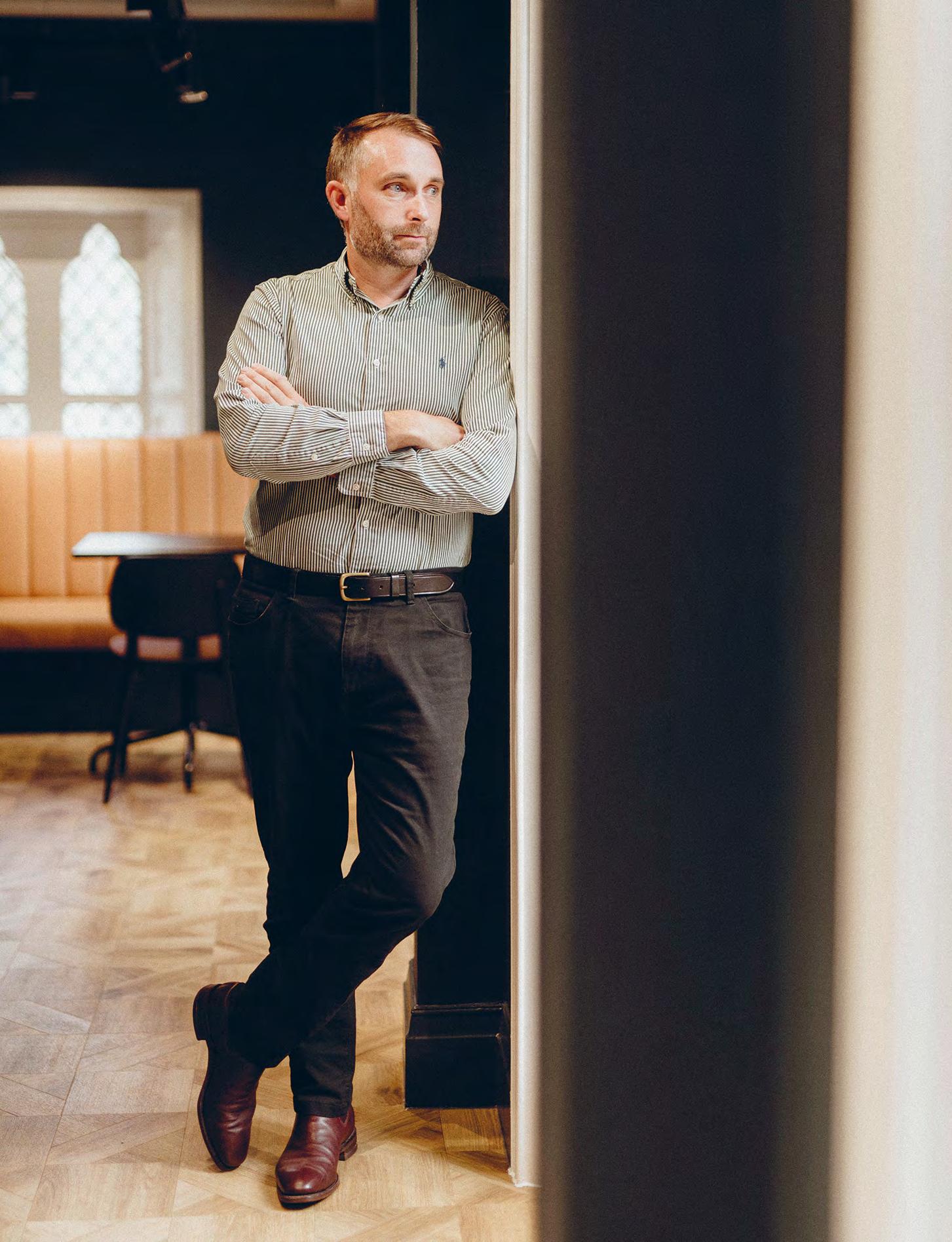
Anyone who has ventured into Newcastle’s city centre recently won’t have failed to notice the progress being made on the £155 million Pilgrim’s Quarter regeneration project, which spans an impressive 463,000sq ft and wraps around four streets.
While less conspicuous, just 50 yards from the development and opposite the Laing Art Gallery, international law firm Hill Dickinson is laying its own foundations in the city at Portland House, with an aim to offer clients a credible alternative in the North East regional market.
Since opening a Newcastle office in 2022, the firm has enjoyed rapid growth, having started with a seven-strong health team.
Now with a headcount of more than 20, the firm has extended into other service areas to broaden its national reach into the North East.
Most recently, in May this year, a new corporate team was established, led by partner Tom Pollard and supported by legal director Liam Stubbs and senior associate Nicole Axon, who have worked with Tom for nine and five years, respectively.
The team is already well-known and established in the North East, having advised on a wide range of regional, national and

international transactions, supporting ambitious businesses, private equity funds, family offices, management teams and high-net-worth investors alike.
Building something exceptional
Tom, who joined the firm alongside Liam and Nicole, says he was attracted by the challenge of establishing a corporate team in the North East and helping grow the wider Newcastle office.
He says: “Our ambition in the North East reflects the vision for our national business services group, which has seen focused expansion through strategic lateral hires, enriching the team with a broad service offering and deep, sector-specific insight.
“We intend to build something exceptional in Newcastle, which will follow the success the firm has already enjoyed when establishing and successfully growing other regional offices, such as Leeds and Birmingham, in recent years.
“Newcastle, and the wider North East, has such a vibrant, creative and resilient business community.
“The region is ambitious and full of dynamic businesses and leaders, and we want to support them with their corporate work as they’re scaling up, securing investment, undertaking an exit or navigating other forms of corporate transactions.
“We also want to support them with their wider business legal needs and, as the office continues to grow, we will be offering a wider range of services locally.
“We’ve seen such rapid growth since opening, and that’s driven by the appetite in the North East for a firm like ours.”
Liam adds: “It’s exciting to be part of a team and firm that is looking to build a significant presence and become a major player in the North East legal market.
“We’ve got a real sense of momentum, and both the office and wider corporate team is growing in a way that reflects the firm’s ambitious growth strategy.”
International reach and expertise
The highly experienced new corporate team specialises in advising on a full range of corporate work, in particular domestic and cross-border transactions, providing North East clients with the highest calibre of advice that Hill Dickinson’s national corporate team is renowned for.
Tom says: “Having a dedicated corporate team in the North East marks an important step in the firm’s commitment to supporting businesses, funders and business leaders in the region.

“It’s about enhancing and strengthening our corporate capabilities in the North East.
“And by combining the team’s expertise with the firm’s wider capabilities, we can offer clients end-to-end advice, whether that’s nationally or internationally.
“It means a business or funder in the North East can enjoy international reach and expertise, without having to go out of region.
“We know from experience that the preference of North East business leaders and funders is always to use advisers in region, for reasons of efficiency but also, importantly, to support the regional economy.”
For Liam and Nicole, one of the biggest draws for joining Hill Dickinson was the chance to help spearhead a new regional corporate team and create a legal powerhouse firmly embedded in the North East, rather than functioning as a satellite office of a larger international firm.
Liam says: “It is really important the Newcastle office has a genuine regional focus.
“We are creating a team that’s firmly rooted in the North East, with the scale of an international firm behind us to help assist our wider ambitions.
“We can really tailor our approach to the North East market and build strong, lasting
relationships with local businesses, investors and the wider professional community.”
Nicole adds: “It’s exciting to be part of something that is genuinely valued and backed by the wider firm’s strategy for national regional expansion.
“We’ve got a lot of autonomy, which we are relishing and putting to good use already.
“The approach at Hill Dickinson is very welcoming, supportive and collaborative, which has been hugely beneficial in allowing us to land so smoothly and integrate the team into the wider firm.”
At the heart of the region
For Tom, the opportunity to create something distinctive – regionally focused but backed by the resources and connections of a Top 50 UK law firm – is exciting.
He says: “As a team we are known for our calm, effective and pragmatic approach to corporate work, delivering a high-quality combination of technical expertise, commercial acumen and excellent client service.
“The opportunities to build upon our existing reputation and continue to deliver clients the best possible legal advice and experience throughout their transactions has been enhanced by joining Hill Dickinson, given their strength in depth.
“We know the North East is a flourishing region ready for growth and investment, and we intend to remain at its heart for years to come.”
And being part of a firm with 12 offices employing more than 1100 people – including seven in the UK and five in Monaco, Limassol, Piraeus, Singapore and Hong Kong – offers further benefits.
Liam says: “The corporate team’s involvement in major cross-border transactions opens doors and provides expertise for clients in the North East that simply wouldn’t be available otherwise.
“We can draw on the market knowledge and intel from our other offices to provide the best possible advice and support to clients, and give them the attention, focus and strategic advice they deserve.”
Nicole adds: “It’s the best of both worlds.
“We get the resources and support of an international firm, but we still have the freedom to tailor our approach to the North East and build real, long-term relationships here.”
The firepower of a national leader
While the transition to Hill Dickinson was a step into new territory, Tom says the response from the business, investor and professional
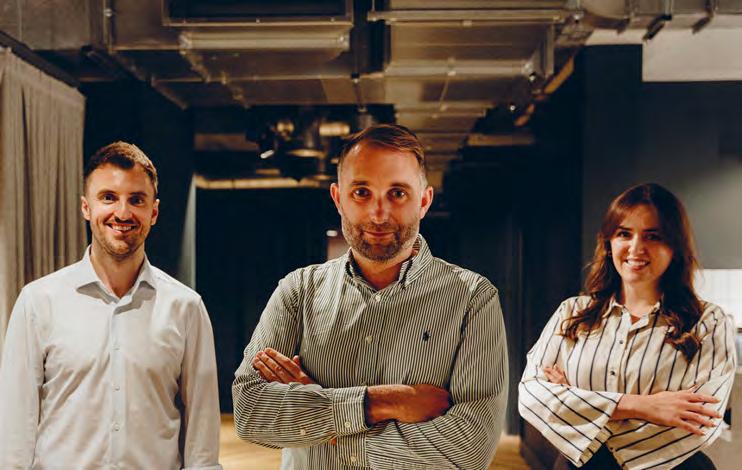
community has been “overwhelmingly positive,” with many “excited to see what we can now deliver”.
He says: “The level of support we have received has been incredible – it has energised the whole team, and we are on track to build something we can all be proud of.
“We have a strong pipeline of regional work, currently undertaking several buyside mandates for North East private equity funds, as well as acting for a number of portfolio companies that are executing buy-and-build growth strategies.
“We’re proud to be playing a key role in the region’s dealmaking activity.”
Liam adds: “Being able to work with a team that is rooted in the North East, but has the backing of a leading national corporate team, gives us an incredible range of experience and expertise that will only benefit clients.
“Clients know they’re getting a team that understands the challenges faced by regional businesses and investors, yet has the knowledge and skill set to provide support across a full deal lifecycle, from initial investment and bolt-on acquisitions to largescale exits.
“Our approach is perhaps best summarised by the words of others, who confirm that we are ‘… a great blend of the warm relationships of a regional firm with the firepower of a national leader’”.
And while Tom and his colleagues are understandably reserved about setting firm targets for growth in the coming months, the imminent arrival of a new associate five months into their new venture underscores their ambition to become “the go-to corporate team in the North East”.
Tom says: “Our plan is to further grow the
corporate team, by building upon the strong foundations we already have and expanding around that with strategic lateral hires that are aligned with the team’s approach to client service standards, quality, culture and approach.
“Over the next few years, our aim is to develop a full-service offering in the North East across the business services group.
“With that in mind, we expect to announce further hires across the Newcastle office in the coming months.”
Liam adds: “We are incredibly ambitious, which is testament to the move we have made and the impact and growth we are driving.
“But success is not just about numbers; it’s about creating a positive culture, sustainable relationships and a reputation for first-class legal advice and support in the North East and beyond.”


FRONT HOUSE OF
Harbour House is the threeyear, seven-figure, self-funded labour of love of Skye-Alexander Ferry and partner Amy-bosé Wilson. As well as designing every aspect, Skye and his 12man team have painstakingly built a mix of creative and wellness studios, hospitality venues and independent retail, bakery, restaurant and bar spaces to create a community of collaboration under one roof. Harbour House – named after the couple’s daughter – is now open, and Colin Young went along to meet the pair and find out more.


Words
by Colin Young
Photography by Andrew Lowe
www.harbourhousecollective.co.uk
Instagram: harbourhouse_
Welcome to Harbour’s House.
Well, technically, this is Harbour House.
It’s the new, risen star of North Shields.
More than just a building, it’s a unique creative space, built over three years with love, attention to detail, the odd nod to the past and designs for the future, and brings together creative community collaboration under one carefully renovated roof.
Creators Skye-Alexander Ferry and partner Amy-bosé Wilson are the parents of two-yearold Harbour.
And as far as their toddler is concerned, this is her house. Harbour’s House.
Amy says: “It wasn’t the plan at the beginning.
“But we realised she’s always been coming to meetings, sitting with me in here and watching daddy and grandad work.
“It just became part of our routine.
“When we pull up outside, she’ll say, ‘Harbour’s House!’, and she can’t wait to get out, run around and see who she knows.
“She loves it here – and she’s been witnessing the changes as she grows.”
Nestled on Little Bedford Street, off the busy Saville Street West, Harbour House was, for years, Kasbah Furniture Market, a weird and wonderful dumping ground from house clearances.
The building was in ruins, Skye admits, three years – and many, many gruelling late nights, early mornings and long days – later.
The top floor alone cost £50,000 to clear out, repair, replenish and reach the standards required for up to 150 guests attending the “unique, curated” weddings and events Amy is now planning.

A DRIVEN AND IMAGINATIVE COMMUNITY
North Shields has always been part of our DNA. It’s where we started and where we’ve grown as an agency over the years.
From working with local clients to now supporting global brands, our roots in North Shields have helped shape who we are and how we work, and we’re committed to continuing to invest in the place where it all began.
The move into Harbour House marks a new chapter for us, one I’m really excited about.
It’s not just about having a physical space, it’s about being part of a creative community that’s driven, imaginative and genuinely invested in supporting each other.
We’re proud to be part of what is being built here.
Paul Hart Managing director Cargo
Born in North Shields but brought up in London from the age of three, Skye returned to the North East to study multimedia design at Northumbria University.
Summer holidays were in the North East, so no surprise he ran successful businesses in the region and acquired property and companies by his mid-20s.
He knew the Kasbah building well. He knew it was a hidden treasure. And he knew it was a chance to build his idyllic work/create/chilled emporium.
He put in a bid on the day it went up for sale “before anyone else realised its potential”.
It then took a year to get planning permission.
Skye says: “I’ve enjoyed the process, but it’s been three years and I just want to get started properly.
“I’ve been on the tools and worked on design, marketing, branding, interiors and admin too.
“It’s been a lot, and having a little girl in between all of it only added to things.
“I’m super creative, but I’ve really enjoyed calculating things.
“If I just wanted to make money, I wouldn’t have done this from the start.
“I could’ve made money more quickly and easily, but this has been a passion project.
“It’s completely independent and self-funded; the same group of lads and my dad have been on site to help me from day one.
“I think my dad’s sick of me now.”
“Skye is unbelievably determined and resilient,”
says Amy, who studied fashion at the same university as Skye, though the couple met in London.
She adds: “Sometimes it feels like three years, and sometimes it feels like a minute because of all the things that have happened and what we’ve achieved.
“And then sometimes it feels like we’ve been here forever.”
“We feel so at home; we’ve created a homely feeling and it is ingrained in us,” adds Amy, who, after a period working in the fashion industry, focusing on her passion for wedding dresses, moved back to the North East.
Our chat takes place before the official opening of the Uncommon restaurant and a month before the first married couple will celebrate at the venue.
As you read this, Harbour House is now open and nearly fully occupied.
In truth, the doors were always open, thanks to a carefully curated online community known as The Houseys.
Skye and Amy created the society as tenants moved in, keeping their ‘Houseys’ updated throughout the process so they felt part of the structure.
The completion of the Uncommon restaurant and bar on the ground floor was the signal to send out invitations.
Skye says: “When I got the building, I initially wanted to do creative studios, but I always imagined having a bar and restaurant as the crown jewel.

AMY


“Things have been added on to that, but the idea was always to work in a place, come down and socialise, have some brunch and then be able to change the place at night.
“That has been a driving force throughout.
“We’ve attached that thought process to Harbour House, designing things differently, keeping it a bit more contemporary but honouring the history of the building.
“We’re celebrating what’s here and adding character, rather than removing the story –we’re adding new chapters to it.”
“And no creative is prim and proper,” adds Amy, who previously opened an interiors company with Skye.
She says: “Everything and everyone is all over the place, so there are rough surfaces and metal
“Even the logo is rough around the edges.
“It needs that rough edge to make it fit with the people in the building.
“It’s not for everyone, but our ‘Houseys’ love it, we love it and Harbour loves it, so that’s all that matters.”
The numbers emphasise the affection for the venue, with 90 per cent of the building occupied across three floors.
Past Uncommon at the entrance is Northern Rye Bakery, opposite TUTTI and florist Muscari.
The first-floor studios and offices are taken up by Cargo, We Rise Wellness Studio, Quay Studio and videographer Paul Geist and creative agency Drishti.
And latest tenant Kove Club is making itself at home too.
The arrival of TUTTI – formerly Tutti & Co – was a coup for Skye and Amy.
Led by designer Kate Rose, the lifestyle brand’s growth has coincided with its move to North Shields.
There are four additional staff, in-house designers and, in Kate, a businesswoman who has embraced the Harbour House ethic.
Amy says: “They’ve always been online and never had a store, but when they saw the project, they wanted to open a studio and expand their creativity here.
“Kate is such an amazing businesswoman; it’s inspiring to be around her and the quality of her products.
“With the name she has in the business world, it’s a big deal for us, and we’re honoured to have them.
“The support we’ve had from Cargo directors Paul and Kirsty has been invaluable too.
“We are so unbelievably grateful for their guidance and help, which they provided before they even moved in.
“And we have all of the other businesses in the building coming together to help too.”
Skye adds: “We like the idea of as many creatives in one building as possible – one from each industry to foster collaboration and build an ecosystem where they help each other.
“I always thought it would be cool to have a space where I could work with other people –more like an event than just a building – and get creatives together.
“I know this concept will work.”
“As a partnership, we’ve got a really good balance of that feminine/masculine energy,” adds Amy, whose responsibilities at Harbour House include serving as director of experience and events.
She says: “Skye is like, ‘right, this is happening, I’m gonna build this now’, and I’ll say, ‘how can I make it better – how can I do it with you?’
“I’ve been looking at the experience of the building and people who are in it, along with the events and the weddings, which will all be curated.
“We’ll go through every little aspect, every tiny detail from lighting to the formation of the room, drinks and curated menus.
“It’s all unique to the couple; it’s their story and Harbour House is a chapter in that story.
“It just made sense for me to be here, because my strongest point is bringing these things to life.
“And, of course, we’ve got florists, a videographer and photographer we can recommend.
“Everything is in the building.”
www.harbourhousecollective.co.uk Instagram: harbourhouse_
THE BEATING HEART OF GROWTH
Harbour House works for us because it’s a place where communities grow.
We joined to foster our own wellness community and be part of a family of businesses – and it’s felt like that from the outset.
The fact there are creatives under the same roof means we can collaborate with one another on events, as well as seek support on elements of the day-to-day running of a small business.
North Shields is going through a period of growth and we very much saw that Harbour House is at the centre – almost the beating heart – of that.
There’s nothing else like it in the North East.
James
Powles Co-founder We Rise Wellness Studios







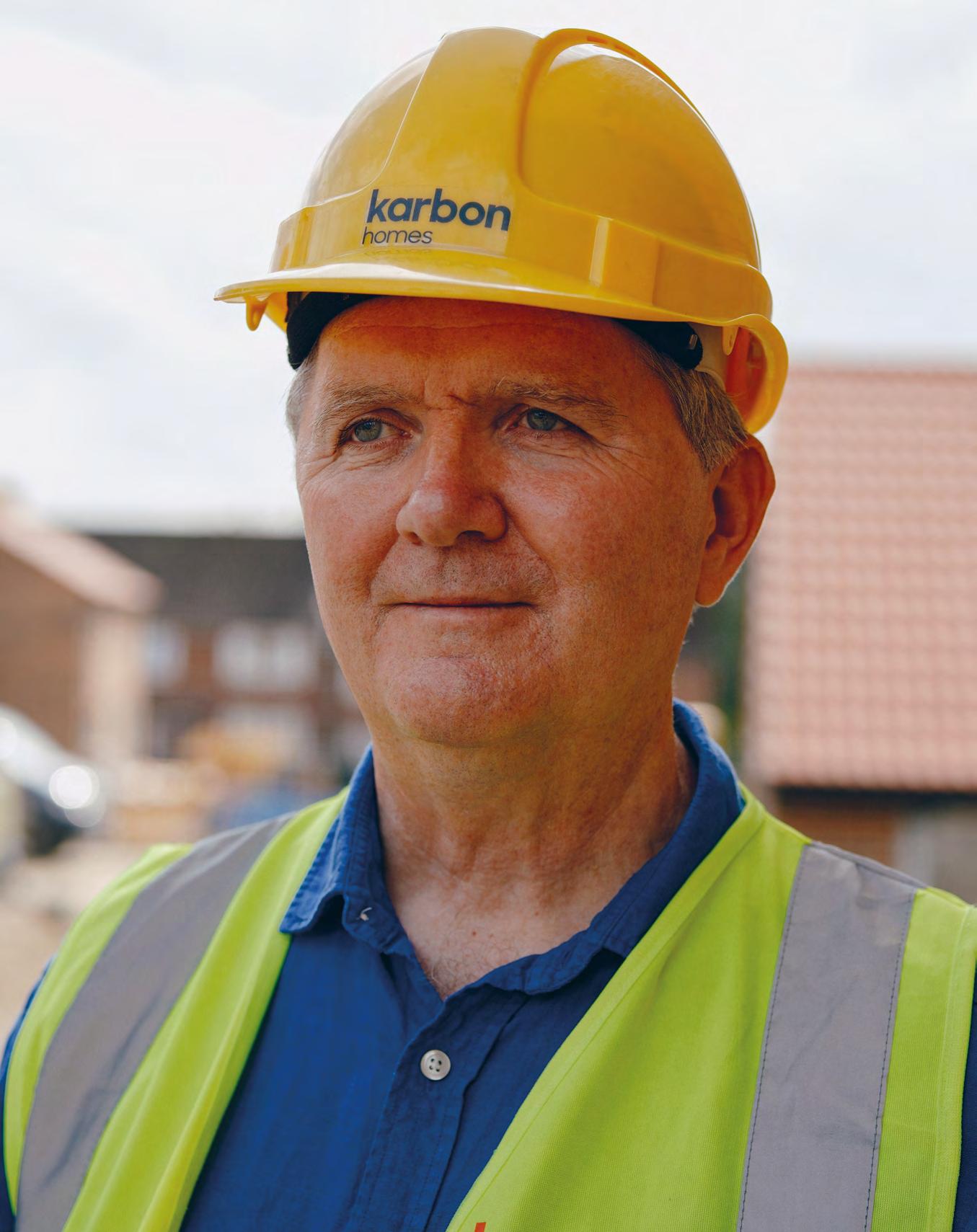




Building strong foundations for life
Housing provides a bedrock for security, dignity and opportunity. For the Karbon Group, it also represents community and hope. Here, Steven Hugill speaks to group chief executive Paul Fiddaman to explore the story behind one of the North East’s largest housing providers, from the social legacy of Ken Loach’s Cathy Come Home to the present-day challenge of creating homes that give people a fairer chance. And in an era of rising costs and pressing climate goals, Paul shares Karbon’s mission to weave resilience, compassion and ambition into the very fabric of residents’ futures.
The graffiti has long gone, not that it matters.
It’s nearly ten years since an exasperated Daniel Blake lumpenly scrawled his frustrations at welfare bureaucracy across the screeded exterior of Newcastle’s Portland House.
But the scene, complete with stunned bystanders, a cheering pink sash-wearing hen party and selfie-stick teens, remains just as enduring.
Ken Loach has that effect.
I, Daniel Blake; Family Life; Kes; Cathy Come Home. Social identity; class conflict; deprivation; poverty.
Unflinching and unequivocal.
And much more than a flicker on a screen.
Cathy Come Home, set in the penurious streets of 1960s Birmingham, jolted Britain awake to its homelessness crisis in literal black and white terms, spurring the creation of charity Shelter and compelling Westminster to build new housing associations across the country’s shires.
Today, its legacy persists through scores of organisations, not least the Newcastleheadquartered Karbon Group.
Founded in 2017 through a three-way merger
of Cestria Community Housing, Derwentside Homes and Isos Housing, its ever-growing portfolio now encompasses nearly 35,000 properties across diverse communities in the North East and Yorkshire.
In an age of housing shortages and lengthening waiting lists, through its Karbon Homes, 54North Homes and Leazes Homes divisions, the organisation is putting Loach’s televisual tenets of dignity, security and a fairer chance into practice, restitching societal fabric in modern-day technicolour.
And it is doing so through a strategy that provides good quality homes, delivers excellent customer service and helps build strong and sustainable places where communities can thrive.
Paul Fiddaman, Karbon Group chief executive, says: “Cathy Come Home had a big ripple effect on the way people looked at homelessness.
“One of its consequences was the Government calling in the great and the good from across the country and teaching them how to set up housing associations.
“If you trace Karbon’s lineage through those associations, you get to a number of small organisations formed in the 1970s through an initiative known as the ‘flowerpot men’ – on
account of them growing these associations.
“One of those organisations was Enterprise 5 and, in its very first board meeting, a founder member remarked, ‘we are about people and their housing. In that order.’
“That represents an amazing summary of what we’ve tried to be as an organisation ever since.”
He adds: “Our core mission is to provide strong foundations for life; we are more than just a landlord, we make an important contribution to the communities we serve.
“Some customers need an affordable home, some a way onto the property ladder.
“Others might need more – financial advice, community services, sheltered accommodation or training that can lead to a new job.
“Whatever people need to feel more secure, confident and happy, we work hard to provide it.
“By providing modern homes with good facilities, we create platforms for people to build successful futures,” adds Paul of Karbon, whose Community Investment Fund provides grants to charities and projects that support with cost of living challenges while building communities through health, wellbeing and place shaping initiatives.
And in an era where a scarcity of available social housing grows ever more acute, Karbon’s strategy is having significant effect.
During the course of its last financial year, the organisation delivered 707 homes across the North East and Yorkshire, through a mix of social and affordable rent, shared ownership and rent-to-buy properties.
This was made possible through a £181 million partnership with the Government’s housing and regeneration agency Homes England, in which Karbon has committed to developing 2324 affordable properties across its catchment area by 2028.

Set to feature 750 affordable homes – of which more than 200 are now under construction by Bowburn-headquartered delivery partner Esh Group – Seaham Garden Village will include a further 750 homes for outright sale through Taylor Wimpey and Miller Homes.
The affordable properties, through a partnership with Durham County Council and the Mining Remediation Authority, will be connected to a mine water district heating system, which, when paired with additional energy efficiency measures, will significantly enhance the homes’ net-zero credentials.
It additionally spent nearly £100 million on maintaining the quality, safety and energy efficiency of its stock, with £17.5 million invested in elevating its entire property catalogue to the Government target of energy rating level EPC C by 2030.
More than 550 further new homes are earmarked for delivery next year, with around £135 million planned to be spent on existing homes across the next five years and £13 million ringfenced to boost nearly 1000 lower performing properties over a 36-month period.





Those works will add to its provision of new properties in Byker, which represent the first affordable housing in the Newcastle district for decades, and Karbon’s flagship Seaham Garden Village development, in east Durham.





The schemes will all play out against a £39 billion Government spending review commitment to boost social housing stock through to 2036.
And Paul says Karbon – which worked alongside 47 contractors and suppliers during its 2024/2025 financial year, and matched a record £2.8 million of social value commitments to various projects and charitable organisations – is more than ready to help turn Westminster’s “welcome” cash pledge into reality.
He says: “My first home was a shared ownership apartment in Newcastle, and it gave me a stable platform to pursue my career.
“But it is much more difficult for younger people to get on the housing ladder in that way today.
“We’ve had decades of underinvestment in housing as a piece of critical national infrastructure.
“Successive Governments have focused on different areas: the Conservatives primarily looked at owner occupation, whereas Labour is much more aligned to the affordable end of the market.
“Years of rent interventions and significant inflation in the building sector have also eroded providers’ financial capacity to deliver new affordable homes.
“In the last 15 to 20 years, the private rented sector has doubled as a proportion of the national housing market to about 21 per cent, with home ownership declining pro rata.
“It has meant the housing offer across large parts of the country, particularly for aspiring homeowners, hasn’t been affordable.”
“Against that backdrop, we are committed to doing everything in our power to do more for people,” adds Paul of Karbon, whose New Start and Green Start programmes play integral roles in helping businesses upskill talent.




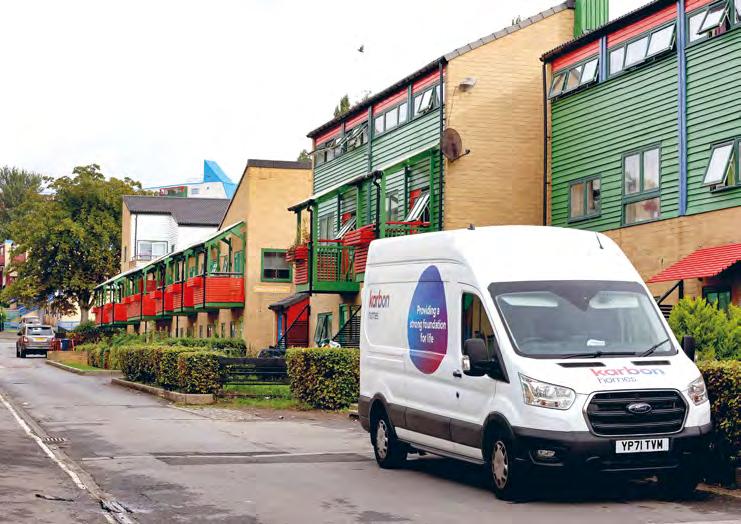




The housing provider’s drive will soon be augmented by Graphite Living, the planned subsidiary of the Karbon Group that Paul says will allow it to “further scale ambitions” alongside an investor partner.
Operating as a jointly-owned, for-profit endeavour – earmarked to be officially registered with the Regulator of Social Housing early next year – Paul says the move will enable Karbon to deliver more homes while retaining its not-for-profit charitable status.
He adds: “Graphite will be a registered housing provider delivering affordable rented accommodation.
“It will be overseen by the Regulator of Social Housing and be subject to the same rent controls, standards of governance and consumer regulation as the other subsidiaries within the Karbon Group.
“Securing funding in a slightly different way, it will play an active part in our development ambitions for the next ten years, allowing us to continue meeting our housing targets.”
The move, says Paul, is set to be additionally supplemented by the “tantalising promise” of devolution, specifically North East mayor Kim McGuinness’ multi-million-pound pledges to build more affordable homes as part of a wider manifesto to tackle child poverty.
Viewing the region through such an inherently local lens, he says, will enable decision-making and investment tailored to exact demand, rather than through a top-down, generic framework.
He says: “Having a mayor focused on equality, child poverty and the condition of homes means we not only have a well-developed understanding of local priorities, but a focal point for housing policy too.


“And thanks to the strategic place partnership between the North East Combined Authority and Homes England, we can make much more locally-nuanced decisions.
“For example, in some parts of the region, where housing isn’t to the quality to which people might aspire, regeneration might be a better and more cost-effective solution than retrofitting to boost properties’ energy performance.
“To have a combined authority partner that understands that, and could influence the way funding is spent to deliver such projects, is a real bonus.”
This focus will be further sharpened by the North East Housing Partnership – wherein Karbon Homes operates as a founding member – which Paul says could deliver as many as 10,000 new properties across the region over the next five years.
Uniting housing associations and local authorities across the North East Combined Authority’s Northumberland-to-County Durham footprint, its partners collectively own and manage more than 200,000 properties.
And this breadth and scale, allied to a September social housing funding bidding round, says Paul – who chairs the North East Housing Partnership – provides no little scope for significant property improvements that would deliver better value for money and realise true economies of scale.
The body is already exploring a raft of opportunities for collaborative delivery, the most advanced being around kitchen installations, which Paul says has the potential to deliver dozens of new jobs and millions of pounds in savings.
He says: “The initial intention of the North East

Housing Partnership was to influence the way an incoming mayor would think about housing challenges, and present ourselves as a natural delivery partner.
“We’re organised around the key themes of regeneration, development and placemaking; net-zero and sustainability; employability and social inclusion; and health, care and homelessness.
“What we do speaks to a lot of mayor McGuinness’ priorities, and the partnership has subsequently evolved to a point where we are now pursuing a number of delivery opportunities.
“We have about 220,000 homes between partner members, which represents a big volume of required investment, and we’re looking at ways to deliver some of that collaboratively.
“The partnership is a real success story on a number of levels, and a taste of what we could achieve going forward if we work together effectively.
“The opportunity is obvious and the conversation is unfolding well at the moment.
“If we go into the bidding round as a partnership, we could potentially deliver 10,000 homes over the next five years.”
Karbon Group
For more information about the Karbon Group, visit the website at the top of this article.
Top talent, local focus: Muckle grows private client team in Teesside
Muckle LLP
www.muckle-llp.com
LinkedIn: Muckle LLP
With B Corp accreditation, awards for its workplace culture, a robust commitment to the communities it serves and a growing team serving clients’ multi-sector needs, Muckle LLP is a law firm on the move. And helping its momentum is partner Leah Duffield, who is using years of experience to boost the firm’s presence across Teesside.
Muckle LLP is in growth mode – and doing things differently.
The North East and Cumbria-based commercial law firm, known for combining legal expertise with community values, has made a strategic appointment to its private client team, reinforcing its commitment to Teesside.
Having joined in early 2025, Leah Duffield brings more than a decade of experience of advising individuals, families and business owners on estate planning, inheritance tax and succession.
Now a partner at Muckle, she is leading the firm’s private client work in Teesside – a move that marks a new chapter for the team and the firm.
But this is more than just growth. It’s purposeled growth, grounded in local knowledge and a people-first culture that has seen Muckle named North East Best Place to Work two years running, with another shortlisting in 2025.
A powerhouse team on the rise
Muckle’s private client team is one of its fastestgrowing divisions.
It grew by 72 per cent in 2022 and a further 11 per cent in 2023/2024, fuelled by specialist recruitment and investment across wills, trusts, estates and succession planning.
Led by David Towns, head of agriculture,
estates and private client, the team is known for handling complex, high-value matters, particularly for business owners, landowners and high-net-worth families.
David says: “Clients want deep expertise and long-term relationships.
“That’s what we deliver – and Leah’s appointment takes it to the next level.”
Homegrown Teesside talent
Leah’s arrival bolsters the firm’s already impressive private client offering.
Born and raised in Middlesbrough, Leah brings more than a decade of experience advising individuals and families with her technical skill, local insight and unwavering focus on doing the right thing for clients.
She says: “I’m thrilled to be part of the Muckle team.
“The firm’s values align completely with mine; it’s about quality, community and putting people first.
“As someone from Teesside, it’s exciting to be part of a team that’s serious about investing here and giving back to the community.”
Leah now leads Muckle’s private client services in Teesside, which is supported by the firm’s wider network across the North East, Cumbria and beyond.
Growth with purpose
Muckle’s success spans more than one practice area.
In 2023/2024, the firm posted £17 million in turnover, with profits up 11 per cent to £4.2 million.
Private client was among the top-performing teams, alongside corporate, employment and dispute resolution.
Momentum continues, with the firm already achieving double-digit growth forecasts for 2025.
But Muckle doesn’t just focus on profit.
As a certified B Corp – one of the few UK law firms to hold the status – it is committed to being a force for good and giving back to the communities in which it operates.
In the past year, Muckle donated more than £51,000 to regional causes via the Muckle Fund at the Community Foundation, provided hundreds of hours of pro bono legal support and backed dozens of volunteering projects.
Anthony Evans, managing partner, says: “People want to work with – and for – a firm that does the right thing.
“Leah’s appointment reflects our commitment to Teesside, where we’re building deeper connections with clients and communities.”
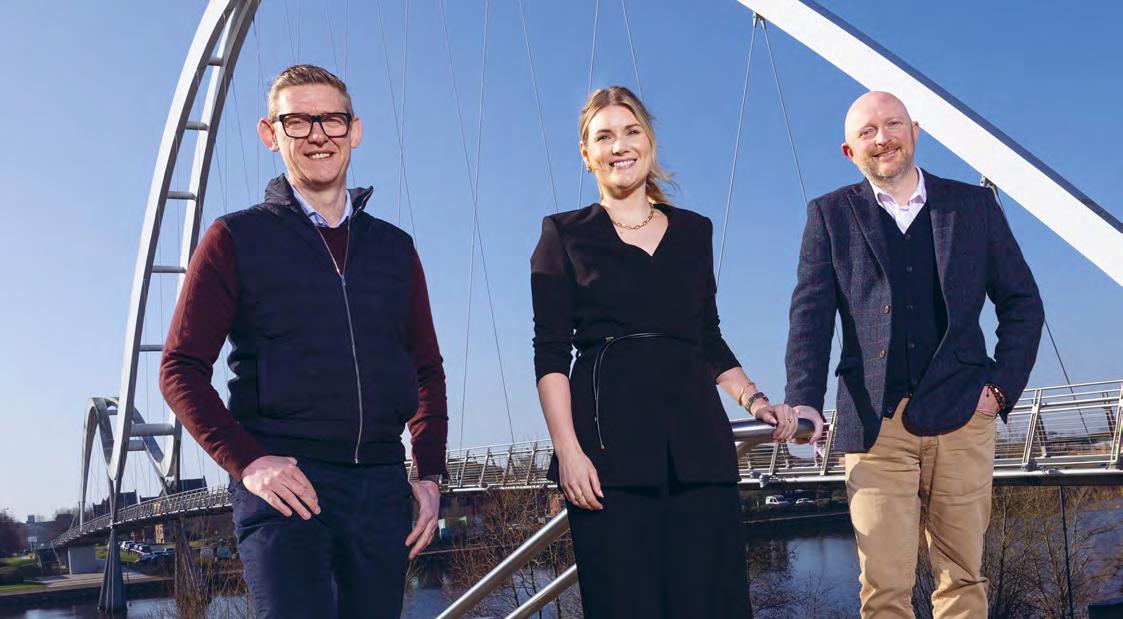
Supporting Teesside’s future
That community ethos was key to Leah’s decision to join.
She says: “Muckle understands that being part of the community means giving back.
“That’s something I’ve always believed in – and the firm lives it every day.”
One example is Clean Slate Solutions, a Teesside charity helping ex-offenders into work.
It recently received another £5000 grant from the Muckle Fund – the third year in a row it has received support.
The firm is also working to improve social mobility in Teesside, an area often described as a ‘cold spot’ for opportunity.
Muckle is a founding member of the North East Solicitor Apprenticeship Scheme and partners with the Social Mobility Foundation to support young people from disadvantaged backgrounds.
It also collaborates with Tees Valley schools, where a high percentage of pupils receive free school meals and are offered insight days and legal career pathways.
Leah adds: “We’re a full-service commercial law firm.
“We support businesses and individuals alike, and we’re invested in this region for the long term.
“There is a lot more to come.”
Teesside in focus
Muckle’s move into Teesside builds on a century of regional commitment.
The firm already advises local organisations including Teesside International Airport, Tees Valley Combined Authority, Wilton Universal Group and the Great North Air Ambulance Service.
Leah’s appointment cements the firm’s ambition to expand not just its commercial footprint, but its personal legal services in the region.
Anthony adds: “Teesside is full of opportunity.
“Leah’s local roots, reputation and leadership make her the ideal person to help us grow our presence and support more families, businesses and individuals with expert advice.”
What’s next?
For clients across the North East, Muckle’s expanding private client offering means greater access to expert advice on family, business and legacy.
With a growing team, a strong ethical foundation and a respected local leader like Leah now in place, Muckle is positioning itself as the go-to firm for the next generation of leading lawyers.
And with a new five-year plan soon to be launched, one thing is clear: Muckle isn’t just growing.
It is growing with purpose.
LLP
To learn more about how Muckle can help you, visit the website at the top of this article, contact Leah Duffield on 0191 211 7790 or email leah.duffield@muckle-llp.com
A fresh era of small business support
The Government unveiled its Small Business Plan over the summer, which came with promises of bold action to tackle late payments, a revamped board of trade to boost exports, moves to revive tired high streets and a £4 billion finance package aimed at helping firms start up and grow. Ministers have pitched it as a watershed moment for entrepreneurs — but does the blueprint live up to Westminster’s hype?

Nicki Clark Chief executive UMi
A positive step for small businesses
We see first-hand the incredible impact small businesses have, but also the challenges they face, on a day-to-day basis.
The Government’s Small Business Plan, including the launch of the Business Growth Service, is a positive step towards making it easier for small businesses to find and access the support and finance they need to survive and thrive.
The Government has invested significant time and effort in engaging the business community, and doing so in a way that has ensured as much participation and breadth of insight as possible.
The result is a plan that is balanced in providing support to all small businesses, and one that can be integrated into the broader national industrial strategy and local growth plans.
We know that accessing the right finance at the right time, and securing more sales alongside a productive and engaged team, are
the key ingredients to helping any business succeed.
The Small Business Plan reflects this and aligns several important commitments and activities to support that.
This includes a new procurement education programme, additional investment in the growth guarantee scheme and start-up loans, as well as investment in supporting access to apprenticeships and the development of T-level skills.
But the benefit of these investments will only be realised in full if businesses can easily find and use them.
The introduction of Business.Gov is therefore a welcome step to helping navigate publiclyfunded support, and this complements our UMi Sat Nav – an online tool for business leaders that was designed to take the hard work out of finding (and using) the best advice and finance from the private, public and social sectors.

We know digital tools are really important channels, but we also know more than 78 per cent of people, regardless of the quality of digital information, will still want to speak to someone and will need additional capacity to implement plans and actions.
Therefore, the ongoing investment in accessing hands-on expertise is vital to converting understanding into practical action for small businesses.

Jennifer Rycroft Executive director of membership and international trade North East Chamber of Commerce
A welcome plan – but match ambition with meaningful action
Small and medium-sized businesses not only employ more than one million people in the North East, but they are a powerful engine for regional growth too.
So it is encouraging to see the Government recognise this with a plan aiming to tackle some of their key challenges.
Access to finance and red tape have long been issues raised by our members.
The expansion of British Business Bank’s lending guarantee scheme and a new wave of start-up loans are positive steps, particularly for businesses in the early stages of growth.
We note the open consultation on tackling late payments.
We know this can cripple a small business, so proposals that strengthen enforcement and improve transparency could make a real difference.
The Chamber will be feeding into this consultation to ensure the voice of North East businesses is heard.
The plan also includes practical support for key sectors, from simplifying licensing for hospitality and the arts, to reviving high street premises and reducing business rates pressures.
Strengthened export support through a refreshed board of trade reflects the ambition
needed to help more North East businesses grow internationally.
Supporting smaller businesses to build leadership skills, adopt new technologies and access apprenticeships is also a positive step.
The launch of the new Business Growth Service is a practical move to simplify what is too often a fragmented support landscape.
Giving businesses a single, clear route to relevant local and national support, based on their postcode and needs, should make it easier to find the help that is right for them.
Additional steps to simplify procurement processes and help smaller firms unlock the value of innovation and intellectual property are also encouraging.
However, the real test will be implementation.
Measures in the plan must be backed by meaningful enforcement, clear communication and strong uptake.
In a difficult trading environment, small businesses need action that delivers tangible results.
If delivered well, the Small Business Plan has the potential to unlock growth, build resilience and support a stronger and fairer North East economy.

The art of the possible: Turning ambition into action
Scaleup North East
www.scaleupnortheast.co.uk
LinkedIn: RTC North
Scaleup North East
To be eligible for Scaleup North East support, companies should be:
• Businesses, including start-ups, which are scaling or can demonstrate significant growth potential
• Based in the areas of Northumberland, North Tyneside, South Tyneside, Newcastleupon-Tyne or the Gateshead Metropolitan Borough
Ideally in the following sectors, although others will be considered:
• Digital and technology
• Health and life sciences
• Low carbon and green growth
• Creative industries
• Advanced manufacturing
The following sectors are not eligible for support:
• Agriculture
• Fishery and aquaculture
• Banking
• Insurance
• Firms should ideally demonstrate a growth rate of 20 per cent over two previous years, or high growth potential, demonstrating growth of above ten per cent and forecasting future growth of at least ten per cent, with increase in employment
For more information, visit www.scaleupnortheast.co.uk
Scaleup North East is delivered by RTC North and funded by the Government through the UK Shared Prosperity Fund. The programme is led by the North East Combined Authority, covering the seven local authority areas of County Durham, Gateshead, Newcastle, North Tyneside, South Tyneside, Sunderland and Northumberland.
The road to business growth is never smooth. From product commercialisation and marketing to recruitment, funding and myriad other challenges, the journey is full of twists and turns. Relief then for Scaleup North East, which provides ambitious founders with crucial support to navigate paths to success. Here, Steven Hugill speaks to Scaleup North East partner Craig Huntingdon to find out more about the Government-backed venture and its impact on businesses’ expansion blueprints.
Craig Huntingdon is running a couple of minutes late.
An unintentional detour from the A66 has taken him along County Durham’s southernmost leafy lanes, past overhanging trees, tangled hedgerows and golden brown late summer fields.
It has also carried him over Winston Bridge, set between Barnard Castle and Darlington where, almost 40 years ago, pilot Ray Hanna sent a Spitfire screaming through the 18th century crossing’s archway for a television adaptation of Derek Robinson’s A Piece of Cake RAF-inspired novel.
As diversions go, it couldn’t be more fitting.
As a partner on Scaleup North East – the Government-backed venture delivered by
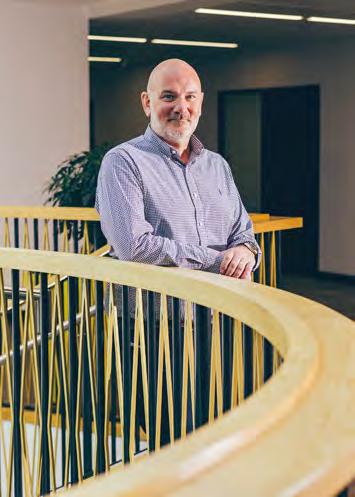
RTC North that helps businessowners plot growth blueprints – Craig is used to navigating unexpected turns in the road.
He’s also well versed in commercial manoeuvres that make the seemingly improbable possible.
Craig says: “Scaleup North East provides aspiring business founders with guidance in a non-prescriptive way.
“We get to know founders and their companies, and understand their growth ambitions, helping to inject confidence in processes, de-risk concepts and boost market connections.
“We show the art of the possible, removing mental barriers to opportunities that exist.
“That often comes by starting with the end goal; by defining that, we’re able to create a pathway to make ambitions a reality,” adds Craig, who is joined by Scaleup North East partners Angelina Bell, Tony Brooks, Dan Martin, Steve Bell and Mark Harrison.
A cornerstone of Scaleup North East’s support is its sector agnostic approach, which has resulted in work with companies such as Newcastle-based Nursem, whose hand creams are used by staff on NHS wards, and fellow Newcastle firm Smart Carbon, known for carbon emissions reporting and reduction support.
Augmented by partners’ experiences as founders and senior-level executives, it delivers insight, perspective and practical strategies to help founders navigate common obstacles.
Craig says: “We work with operators spanning a number of sectors.
“They’re not looking for an industry expert because they’re already brilliant at what they do.
“Instead, they want help with commercialising
and marketing products.”
“That’s where the broad knowledge and expertise of Scaleup North East’s partners comes in,” says Craig, who spent time as an Aldi trading director after globally scaling a wall covering manufacturer following a management buyout in his early 20s.
He adds: “It’s the same with other growth barriers like recruitment.
“Some founders blame themselves for failing to find the right staff, but they’re too often looking through the prism of their processes being wrong, rather than a lack of suitable candidates.
“We help revise their outlooks and show them they’re not approaching challenges alone.”
And this is all the more crucial, says Craig, in a regional landscape where latest figures show 1545 businesses that qualify as scale-ups or stand close to the landmark are collectively turning over nearly £15 billion and employing more than 118,000 people.
He says: “The density of scale-ups has a positive proportionate effect on a region’s surrounding economy.
“Scale-up firms, which grow at more than 20 per cent for at least three years, are the backbone of economic transformation.
“Having more of them equates to a regional growth engine powering a stronger economy.
“And that is very important from an inward investment perspective too, because if you’re looking to move into the UK from overseas, you want to operate in an area with the largest possible set of assets.”
To maintain that momentum, Craig says the
North East must continue carving its own identity, rather than impersonating models in London, Manchester and Birmingham.
And through its support mechanisms, he says Scaleup North East, which has also worked with Newcastle-founded Care Messenger – whose partnership with global electronic products maker LG is addressing low technology adoption in the elderly that leads to loneliness and social exclusion – is helping founders dial into opportunities directly attuned to the area’s nuances.
He says: “We don’t have some of the economic assets to support scale-ups like London, Manchester and Birmingham.
“But we do have capital efficiency; we can do a lot more in the North East because the cost of doing business here is lower.
“Companies are learning to make money stretch further, which is extending runways and, when combined with productivity per scale-up, the North East is punching above its weight.”
This performance, says Craig, is unfolding across numerous sectors, with the innovative legacy of the region’s industrial past helping engender multifarious prospects underpinned by a “build it here and sell to the world” approach.
He says: “Manufacturers and engineering firms are tapping into global supply chains, with their close proximity to the North East’s ports providing a genuine advantage.
“The region’s health and life science ventures are benefitting from strong partnerships with NHS trusts and universities; its digital and artificial intelligence businesses are thriving because they can scale products with a far
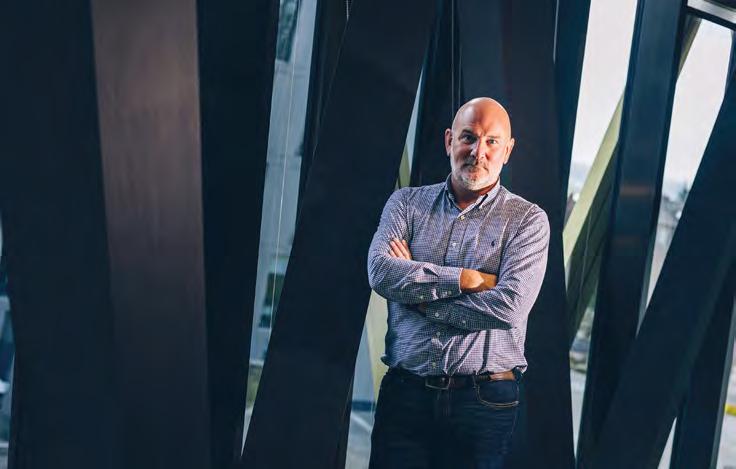



lower cost base than London peers; and the North East is a pioneering area for energy transition too.
“It all proves the North East doesn’t need to mimic the scale-up playbook of other areas, and that business owners can scale from the region in a sustainable and compelling manner.”
He adds: “By using available assets, building the right team early and focusing relentlessly on markets where they have an edge, businesses can thrive from the North East.
“We must harness our unique assets.
“The North East has grit, resilience and tenacity – baked-in human factors that make all the difference when growing a business – in abundance.
“And using our unique assets, we can successfully scale businesses here on our own terms.
“The North East has always been about making things work, and its scale-up story is far from over.”
The UK Shared Prosperity Fund
The UK Shared Prosperity Fund proactively supports mission-delivery: pushing power out to communities everywhere, with a specific focus to helping kickstart economic growth and promoting opportunities in all parts of the UK.
The Government’s Autumn Budget announced a further £900 million of funding for local investment by March 2026, with a transition year administered throughout the former North of Tyne region by the North East Combined Authority.
For more information, visit www.gov.uk/ government/publications/uk-sharedprosperity-fund-prospectus
RTC North
RTC North is a leading provider of business support and innovation services, working with organisations to unlock their potential and achieve sustainable growth. With a wealth of expertise and a commitment to excellence, RTC North empowers businesses to overcome challenges, embrace opportunities and drive success in a rapidly evolving marketplace.


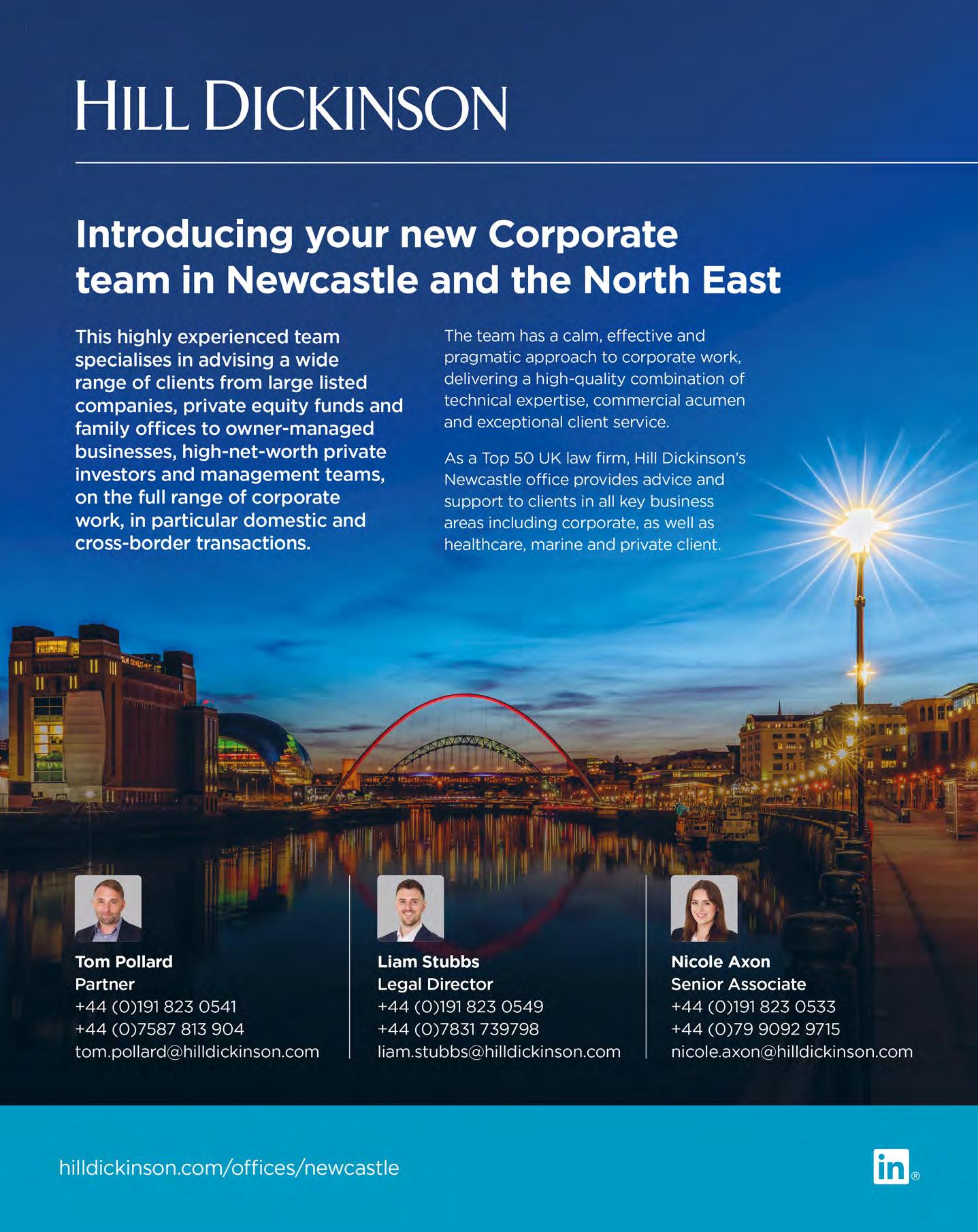

Global space leaders land in Durham
Space North East England www.spacenortheastengland.com
LinkedIn: Space North East England
Durham took centre stage over the summer as the North East Space Conference spotlighted the region’s role in future interstellar ventures. Attracting hundreds of delegates and scores of world-leading organisations, the event underlined how the North East is primed to be a leading force across future decades. Here, Space North East England partner Business Durham highlights key messages from the event.
Durham played host to the sold-out North East Space Conference over the summer, welcoming more than 350 delegates and exhibitors from across the globe.
Leading figures from the UK, Europe and the US converged on the region to explore how the North East can play a major role in the next era of British space endeavour.
The day opened with an address from John Bone, chair of Space North East England, who described the event as “a brilliant vehicle to showcase how much work is going on in the space sector in the North East.”
Attendees included representatives from the European Space Agency, UK Space Agency and major aerospace companies including Lockheed Martin, Raytheon and Airbus, who were all keen to understand the region’s growing influence.
Launching the UK’s space ambitions
A standout session came from Matthew Archer, director of launch at the UK Space Agency, who outlined the national strategy for launching rockets from UK soil.
He highlighted SaxaVord spaceport in Shetland, now operational and expected to deliver regular launches – as well as thousands of skilled jobs – over the coming years.
Matthew noted 20 per cent of the UK economy is now linked to the space sector, and that the North East – with its strong engineering and manufacturing heritage – is uniquely positioned to support that growth.
James Osborn, of Durham University, added academic insight, outlining investments including a £5 million boost to the Durham Space Research Centre, and the role of the North East Space Cluster in creating a talent pipeline and driving innovation.
Northumbria University’s North East Space Skills and Technology Centre (NESST) took centre stage during the conference.
Backed by a £50 million investment from Lockheed Martin and the UK Space Agency, NESST is emerging on the Newcastle skyline as a symbol of regional ambition.
The facility will offer advanced training and research and development capacity, bridging gaps between academia, business and government.
NESST is recognised as a vital step in nurturing the next generation of space pioneers and embedding skilled roles within the local economy.
Filtronic leads space-grade innovation
Filtronic stood out among local companies.
Based at NETPark, in Sedgefield, County Durham, Filtronic designs and makes satellite communications, radar and 5G hardware.
Its presentation demonstrated how a regional SME can scale to become a global partner in space and advanced communications, offering a clear blueprint for other North East businesses looking to pivot into the sector.
Its success, built on smart collaboration and innovation assets, was a highlight of the day.
Florida delegation lands in Durham
Another dynamic element of the conference was the high-profile Florida Space Agency delegation, including vice president Matt Chesnut, who joined panel discussions and gave a keynote talk.
Matt spoke about Florida’s 51 launches this year, positioning the state as the world’s busiest spaceport and a global leader in the sector.
He drew clear parallels between Florida and the North East – both hubs of engineering and skills development – and suggested strong potential for bilateral collaboration.
Highlighting shared ambitions in manufacturing, training and components, he added: “We’re here to explore how we fit together.”
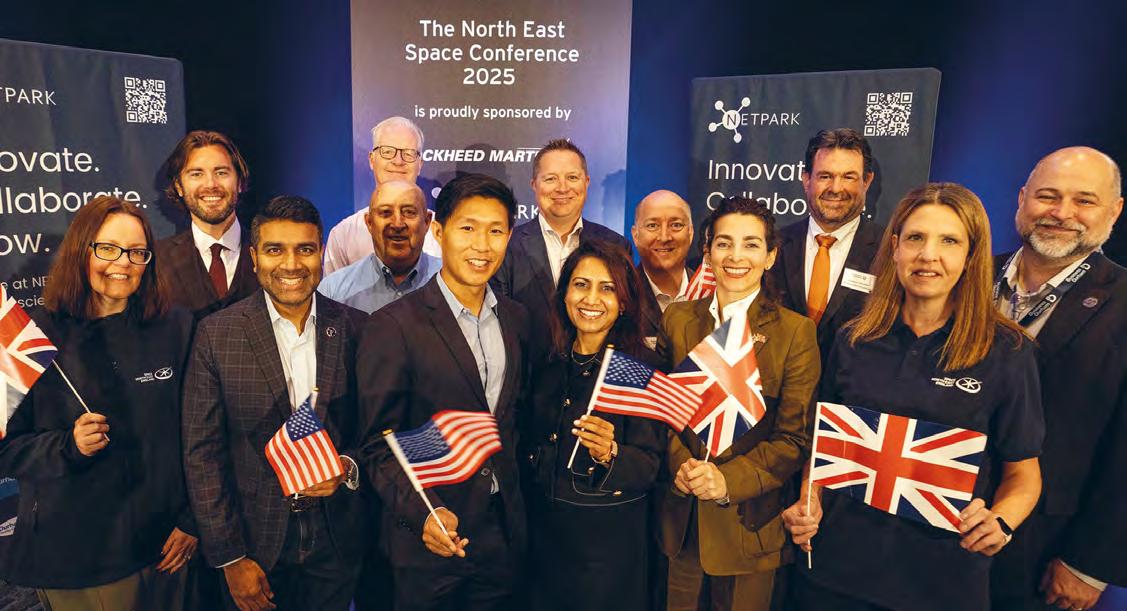
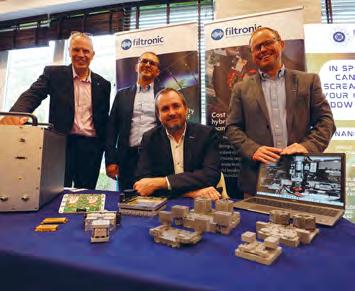
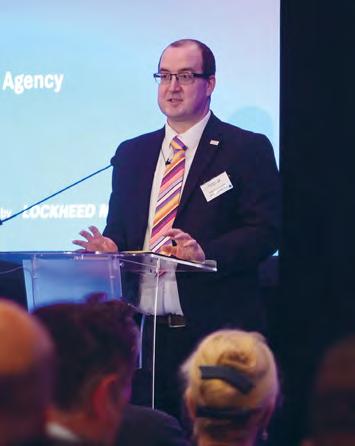
Why the North East matters: a region ready to launch
Beyond headline speakers, the conference showcased a shared vision: to grow regional employment in space from around 1300 professionals today to more than 10,000 by 2030.
This ambition builds on established strengths: science parks like NETPark, five collaborating universities and more than 50 specialised businesses generating £113 million in annual turnover. Industry-led innovation, investment and academic partnerships were central to the event.
But the most lasting impact was the energy around new partnerships between SMEs, universities, government agencies and global collaborators.
John said: “Relationships and partnerships are cemented… people get work done and progress is made.”
How businesses can get involved with the Space North East England Cluster
For companies looking to break into the fastgrowing space sector, joining the Space North East England Cluster offers an ideal entry point.
The cluster brings together more than 50 companies and more than 1400 staff, serving as a gateway to collaboration, funding, supply chains and academic partnerships.
Whether you’re an established player or entering the sector from manufacturing, digital,
materials or optics, there are multiple ways to engage:
• Join the cluster to access events, project opportunities and funding calls
• Collaborate with universities and regional assets such as NETPark, Durham University and the NESST Centre
• Get involved in training and skills programmes, including student placements and STEM initiatives
• Explore international collaboration, including opportunities with ESA, UK Space Agency and global partners like Florida Space
North East England isn’t just about rockets, it’s about unlocking cross-sector growth rooted in the region’s industrial DNA.
With the conference showcasing what’s possible, the invitation is open: join the cluster, plug into a thriving ecosystem and help shape the UK’s next generation of space innovation.
Space North East England
To learn more about Space North East England, visit www.spacenortheastengland.com/
Business Durham
To find out more about Business Durham and the services it provides to aid organisations’ growth plans, visit the website at the top of this article.

Setting new boundaries for female funding
As an England international cricketer, Bess Heath knows all about the importance of strong partnerships. And now, alongside Maven Capital Partners, she is extending that ethos into the business world, with a sponsorship deal helping highlight the private equity and venture capital firm’s work to empower female founders to raise investment and scale their businesses. Here, Colin Young speaks to Bess and Maven investment manager Rebecca Minchella to find out more.
www.mavencp.com
LinkedIn: Maven Capital Partners
Bess Heath has been living the cricketing dream this summer.
The England wicketkeeper/batter has been centre stage since signing up for Durham Women’s first season as a professional outfit.
Bess and her team-mates should finish above mid-table in the ECB’s Tier 1 eight-team league, which was established for an initial three seasons earlier this year.
She was also part of The Hundred-winning Northern Superchargers team that beat London Spirit in the 100-ball-a-side competition’s showpiece final.
Durham’s T20 performances could have been better, she admits, after they missed out on silverware, but the team has improved as the summer has progressed.
They have set the foundations for next season and campaigns to come.
“We’ve gelled really well as a team, and it’s starting to become like a family,” says Bess, who has three older brothers.
She adds: “I think it’s important that shows on the cricket pitch, and that you have a kind of sisterhood out there.
“We got off to a slow start, but after the midseason break, we got on a bit of a winning run and put in some good performances.
“Being such a big change for a lot of people, I think we’ve done well, and there are some definite positives to take throughout the summer, as well as some learnings to take into the winter.
“Hopefully, we’ll come back firing next summer.
“It’s fulfilled what we wanted in a lot of ways, but we want to keep progressing, keep pushing ourselves and keep those professional
standards rising.
“I don’t think we ever really want to settle.” It isn’t just the performances on the Banks Homes Riverside square that have been important this year for Bess and the rest of the Durham Women squad, though.
They know they are trailblazers as Durham’s first full-time female players, and with that comes the responsibility of spreading the message from their Chester-le-Street base across the North East.
Bess, who originates from Derbyshire, says the squad embraced that role from the moment they took the field for the first time in May –when they beat Essex by six wickets – to their first home game against Lancashire a month later, which attracted hundreds of first-time fans.
Bess even met a young fan with the same name.
She says: “She was at one of the games and said, ‘I’ve never met a Bess before, can you sign my number six, please?’
“And I said, ‘I don’t think I’ve ever met a Bess before either – of course I’ll sign it’.
“It’s little moments like that that really have an impact.”
And it won’t stop there, with Durham Women Football Club also planning to become part of the sporting revolution at the Riverside when they move from their current Durham University ground to a new custom-built stadium and training centre.
Bess says: “When we had that first game here, the crowd that came down and the support we got felt very cool.
“And we just want more of it – more girls, clubs and schools coming down to show what we can put on here.
“I think we have a massive opportunity to bring cricket back here with a bit of force and passion.
“With the plans that are afoot, this could be amazing.
“And if you’re one of the original people to be a part of that, I think that’s quite a unique opportunity.
“It is so exciting to be a part of it, to be part of the change and the movement towards more sport, more passion and a strong bond across the North East.
“For me, it’s exciting to be at the start of it and see it all happen, and be a part of the change.
“I love change.
“If it’s already built and already there, you become one of the many to experience something, but we have an opportunity to start something, build on it, help out and create more of a community.
“I’m all for it.”
Fitting then that Bess is one of the players now sponsored by Maven Capital Partners, a UK-wide investor with North East offices in Newcastle, Durham and Middlesbrough.
The programme’s purpose is to empower women to explore how investment can help scale their businesses while demystifying some of the myths around raising investment.
For Maven investment manager Rebecca Minchella, like England’s Euro 2025 champions in football, Bess represents the kind of women who can succeed in sport and inspire in business.
Rebecca says: “Sport is a huge part of my life. “At Maven, we’re very much behind all of the positive things that female sport represents, and we try and take some of the impact of that into the world of business.
“I think we have a massive opportunity to bring cricket back here with a bit of force and passion”
Maven, which sponsored the team’s training top last year, is one of the country’s leading private equity and venture capital firms, investing from various funds under management including the Northern Powerhouse Investment Fund II –NE Equity Fund, managed on behalf of British Business Bank, and the Finance Durham Fund, which is managed on behalf of Durham County Council by Business Durham.
Various other funds provide capital to unlock business growth, including Maven’s Venture Capital Trusts.
In addition to supporting businesses on their growth journeys, Maven launched the Female Founder Funding Programme from the North East, aimed at offering valuable resources, mentorship and collaboration opportunities for female entrepreneurs wanting to find out more about raising investment.


“I’m really passionate about the impact of sport, particularly on young women but females in general, and all of those skills that you develop that translate in business and in positions of leadership.
“A lot of the work we do is supporting female entrepreneurs to start, build and scale their business with funding in the future, so there are a lot of alignments with Durham Women Cricket: ambitious, a great set-up and pushing for growth.
“If you can’t see it, you can’t be it – and it’s the same here.
“The goal for us is to invest in more female-led businesses, and that’s something we are doing”
“I know, because I’m fortunate to see it every day, that in business, there are a lot of successful female entrepreneurs in the North East. “But we don’t often talk about how good we are.
“It’s all about creating case studies, and there are so many things you can take away from
sport that translate into business – confidence, resilience, leadership, grit, determination.
“One of the best parts of my job is meeting inspiring entrepreneurs every day, finding out more about their ambitions and unpicking and demystifying funding, and making it more of a tangible process that women feel they can go through.
“It is all about opening doors.
“The goal for us is to invest in more female-led businesses, and that’s something we are doing.”
England development contract player Bess has her own long-term business aspirations, as Rebecca discovers when the pair meet ahead of our interview in one of the Banks Homes Riverside boxes.
Bess helped out with her family’s tree surgery business from a young age – and knows how to handle a chainsaw – and would like to open her own coffee shop after retirement.
Aged 23, with five England appearances to her name so far across all formats, stints in Australia and with The Hundred’s Northern Superchargers, that will be some time off.
But with the likes of Maven behind her – and businesswomen across the North East – she will not be short of support, both on and off the pitch.
Bess adds: “I can imagine there are similarities with a successful cricket team and success in the business world, because you’ve got a team you want to work to the best of its ability for that one goal.
“It’s how you keep them working towards that and keep the passion.
“And you’ve got to have discipline and motivation to succeed.”

Maven
For more information about Maven and its portfolio of business support, including the Female Founder Funding Programme, visit the website at the top of this article.
Celebrating the achievements shaping tomorrow’s Britain
TDR www.tdrtraining.co.uk
LinkedIn: TDR Training & Trust
With a history tracing back more than 140 years, TDR Training runs like a golden thread through the North East’s training landscape. And it will celebrate its latest successes at the TDR Trust Apprenticeship Awards in October. Here, the North Tyneside-based apprenticeship and training provider reveals more about the showpiece ceremony and emphasises its commitment to nurturing the engineering, manufacturing, science and business stars of tomorrow.
TDR Training will proudly host one of the North East’s most anticipated events in education and industry on Thursday, October 16 – the TDR Trust Apprenticeship Awards. Held at the heart of the region’s innovation hub, the evening will honour the exceptional achievements of apprentices and employers across engineering, manufacturing, science and business.
As the UK faces a critical skills shortage in technical and industrial sectors, events like these are more than just a celebration – they are a call to action.
The awards spotlight the individuals and organisations driving progress, resilience and renewal in our economy.
From Technical Apprentice of the Year to Outstanding Contribution to Apprenticeships, each category reflects the dedication of a region determined to grow its talent pool and industrial legacy.


Our partnership with TDR plays an important role in developing the next generation of engineers for the hydrogen sector, who gain hands-on experience in mechanical, electrical and control systems.
They go on to work at our manufacturing base in collaboration with Siemens Energy in Newcastle, at our hydrogen production sites in the Midlands, or operate our hydrogen power units across the UK.
They play a direct role in supporting the UK’s net-zero ambitions.
Derek
Bulmer, chief financial officer
TDR Training, a cornerstone of the North East’s training landscape, has a proud history dating back to 1882 when William Doxford laid the foundations for engineering excellence.
Today, under the leadership of chief executive Li Xue, it continues to evolve, offering cuttingedge facilities in mechanical and electrical engineering, CNC machining, welding, fabrication, maintenance and more, all housed at a fully-integrated centre on North Tyneside’s Quorum Business Park.
At a time when the UK must rebuild its industrial strength, TDR stands as a beacon of hope and action.
The North East has long been a powerhouse of engineering talent, and TDR’s commitment to inclusivity, opportunity and excellence ensures that tradition continues.
CMP
As a market-leading designer and manufacturer of cable glands, cable cleats and accessories, our international reputation for quality and reliability is underpinned by our commitment to developing talent and investing in the future.
Supporting the TDR Trust Apprenticeship Awards is a natural extension of this commitment.
TDR has been a valued partner in guiding our apprentices through their training, with many going on to become integral members of our team.
Vince Patterson, chief executive
Trinity Precision
Engineering apprentices are a vital pathway towards the country’s prosperity, and we do everything possible to support them to achieve their full potential.
Most apprentices are coming straight from educational institutions, which is not an easy task for them, and we needed a partner to help us with their transformation.
We chose TDR due to its leadership in the field.
Understanding the need to develop and retain new talent is why we believe in supporting the TDR Trust Apprenticeship Awards 2025.
Vickie Henderson, financial director
Purmo Group (UK)
We have a very strong commitment to learning and development, and a key part of this is supporting apprentices in the North East.
We have worked with TDR for many years and recruited some excellent young people, many of whom stay with the business for long periods of time and work their way upwards.
We are delighted to support the TDR Trust Apprenticeship Awards.
Helen Duke, HR manager
Smulders
Our mission is to ensure we continue to support and develop new skills and talent, and we believe that begins by investing in diverse and skilled individuals.
Supporting these awards is part of our commitment to empowering the next generation.
We’re inspired by the work TDR Trust does to build strong futures through apprenticeships and are honoured to play a part in recognising outstanding apprentices across the UK.
Amanda Young, HR manager, Smulders Projects UK

Chair Olivia Grant says: “Apprentices can become highly-qualified engineers – a skill and role that enables long-term growth and vital opportunities.”
The UK’s future depends on its ability to train, retain and empower the next generation of engineers, scientists and innovators.
With global competition intensifying and technological change accelerating, we must invest in people.
TDR’s motto – By Science, Industry and Honour – is not just a tradition, it’s a promise to the region and the nation.
As the Apprenticeship Awards approach, TDR Training invites the community, industry leaders and policymakers to join the celebrations of achievements that will shape tomorrow’s Britain.
Together, we can make the country good again by training more people, honouring our industrial heritage and building a future rooted in skill, pride and purpose.
We pride ourselves on being a family business, and that is one of the reasons why we are so keen to support the TDR Trust Apprenticeship Awards.
As a company, we know how nice it is to receive recognition.
But it’s perhaps most important for the younger generation to be noticed and encouraged, because they’re the future of so many of the region’s businesses.
Gary Wilson, director
TDR
For more information about TDR Training, its curriculum and its trust model, visit the website at the top of this article.
Putting compassion and expertise at the heart of Court of Protection work
Hay & Kilner
www.hay-kilner.co.uk
Instagram: @Hay_Kilner
LinkedIn: Hay & Kilner
Hay & Kilner’s well-renowned private client team handles Court of Protection matters and is dedicated to helping those who lack capacity through illness, disability or traumatic brain injury, their family, friends and loved ones. The Newcastle-based firm’s team acts as a professional financial deputy, assists clients to be appointed as financial deputy and provides current deputies with advice. It is also expert in making statutory will and other specialist Court of Protection applications. Here, Claire French, Hay & Kilner partner, reveals more about her role and the firm’s Court of Protection team.

I lead the Court of Protection team at Hay & Kilner, where I manage the property and financial affairs of clients who lack the mental capacity to do so themselves.
I work alongside Court of Protection solicitor Zoey Phillips and a dedicated team, and together we provide tailored, long-term support.
We have a unique team of people, who passionately care about helping clients.
Our team is described as open, empathetic, honest, approachable, caring and fair.
Many of our clients have received substantial personal injury awards, often as a result of road traffic accidents or birth injuries.
While most can manage day-to-day spending, they typically need help with more complex financial decisions.
That includes budgeting for the future, making suitable investments, overseeing property renovations, arranging insurance and setting up care packages.
Our team provides vital support with such matters, working collaboratively with other professionals such as case managers, financial advisors and care and therapy providers.
I’m also a qualified trust and estate practitioner, which means I regularly draft wills, trusts and statements for clients.
In addition, I assist with a wide range of deputyship applications.
This might involve helping someone apply to become a deputy or supporting an existing deputy in applying to the court for special permissions, such as buying property or putting a statutory will in place.
Court of Protection clients
Claire, Zoey and the team typically work with a wide range of clients, most of whom have sustained brain injuries.
“Our team is described as open, empathetic, honest, approachable, caring and fair”
These clients vary in age, from those with birthrelated injuries to individuals who acquire brain injuries later in life.
Their care needs differ significantly; some require 24-hour support, while others need only minimal assistance.
The impact of brain injuries also varies, with some clients experiencing complex cognitive or behavioural challenges.
Among the most difficult cases are those involving clients who appear physically capable but are unaware of their cognitive impairments.
Clients also come from diverse socio-economic backgrounds, contributing to the variety and complexity of the role.
“My clients’ situations can naturally be very challenging for both themselves and their loved ones”
Zoey supports both lay and professional deputy applications, and prepares Court of Protection costs reports for UK and Gibraltar clients.
Clients praise Zoey for her energy, client care, clear communication and compassionate support during complex Court of Protection processes.
Zoey says: “The Court of Protection helps make sure people who lack capacity can’t be exploited or denied their rights, with a Courtappointed deputy working to ensure decisions are made in the best interests of each individual.
“My clients’ situations can naturally be very challenging for both themselves and their loved ones, and it’s my role to ensure their affairs run as smoothly as possible for all concerned.
“I began working on Court of Protection matters during my training contract and took to it straightaway; no two days are ever the same, and you make a genuine difference to the lives of the people you work with.”
How Hay & Kilner can help
Hay & Kilner will talk you through how to become a deputy and complete the application on your behalf.
Alternatively, it can take on the role of a professional deputy.

Hay & Kilner
Hay & Kilner is one of the North East’s leading independent law firms and provides comprehensive legal advice across every aspect of the law to businesses and individuals from inside and outside the region.
To find out more about its services, including its Court of Protection support, visit the website at the top of this article or call 0191 232 8345.
Harnessing industry experience to inspire tomorrow’s talent
Catherine Smith has worked in one of the most pressurised kitchens in the world. Charlotte Brass is a trailblazer in North East mechanical engineering and links with education. Their chosen professions and industries may be vastly different, but their experiences are invaluable. And now, at Gateshead College, they are helping shape the chefs and engineers of the future, using their on-the-job expertise to give insights not found in a textbook or online guide. Here, Colin Young travels across the college’s campus to discover how Catherine and Charlotte are inspiring the students of tomorrow.

Enfields Kitchen will open its doors again to customers this month.
Set on the first floor of Gateshead College’s Baltic campus, this is a restaurant with a difference.
It is run by Gateshead College catering students – with a little guidance from their three teachers – who are given every hands-on kitchen experience, from prep-to-plate and anything in between.
The new term also means catering teacher Catherine Smith will welcome her first intake into the college since she joined in March.
Catherine is no stranger to Enfields Kitchen and its long-term benefits.
She has worked here – she studied and perfected her patisserie craft in the kitchen classrooms next door – before going on to thrive in one of the most demanding restaurants in the country.
More than ten years ago, Catherine trained at Gateshead College as an adult learner, winning student of the year in 2013, before embarking on a successful career in the culinary world.
After working at Jesmond Dene House, she had a four-year stint at The Ritz in London, then Bettys Cookery School in Harrogate and the Alice Hawthorne, near York, before returning to the North East and Blackfriars in Newcastle.
And now she is back where it all started, determined to inspire the students of tomorrow.
And she knows Enfields Kitchen is the perfect environment to learn every aspect of their trade.
Catherine, who is undertaking a vocational assessors course at the start of term, says: “The restaurant experience is huge.
“When you enrol on one of the three courses here, you’re also expected to do front of house.
“So, when students come along, they might sign up thinking, ‘I want to be a chef’, and we have to remind them that as well as doing that, they’ll also be serving customers in the restaurant.
“It is getting them prepared for the industry, and giving them guidance on where they want to work.
“I want to open students’ eyes to what it’s about and point them in the right direction, and Gateshead College is all about getting students into jobs and the right environment.
“If you haven’t worked in the industry yourself, it’s hard to give them advice.

“They get the benefit of the people with industry experience.”
On the day we meet, without the bar, coffee machine and functioning wine fridge, it’s hard to believe Enfields Kitchen is a restaurant at all.
A deep-clean has been in progress for several weeks, so every knife and fork, plate, colourcoded chopping board, herb and spice, cooking utensil, pot and pan is piled high and shining neatly in the mid-morning sunlight.
Catherine’s interest in cooking was sparked by Granny Jean in her farmhouse kitchen on Hill Head Farm, in Shilbottle, near Alnwick, which is now run by her brother Gordon.
She was always interested in food and baking, but from a young age didn’t realise she could be ‘taught’ cookery skills.
That would explain the countryside management degree at Aberystwyth University and signing up for a one-year cookery course at Gateshead College four years later, which eventually saw her join the pastry team at The Ritz.
She now wants to teach nearer home and inspire new generations, including the apprentices in the kitchen who have yearlong roles at places such as Fenwick, and are in college practising for their all-important assessments.
Catherine says: “I knew this was an opportunity I couldn’t turn down.
“I’d been doing some teaching and was really enjoying it, and thought it would be really nice to do it on a level where you have a year with the same students, and you can nurture people over time.
“When I was here, the things that stood out were the guest speakers with the interesting stories – like the ex-head chef of The Ritz who had an unbelievable life story.
“I can now tell students my story.
“A – I didn’t know I wanted to be a chef straightaway, and B – I took the wrong course when I first came out of school.
“In one of my first talks here, I showed them some photos of the very first cake I’d made
compared to ones years later, because I like to show people my development as a chef.
“You don’t have to be brilliant right from the beginning; I’m still learning loads of things now.
“I think that’s a good and inspiring story, without bragging. I’ve got lots of those!”
Over at the Gateshead College Skills Academy for Automotive and Engineering, in Team Valley, Charlotte Brass has also been preparing for the return of students for her ninth year.
Like Catherine, Charlotte is using her vast experience in the workplace to help shape the future of mechanical engineering in her role as curriculum leader for apprenticeships and higher education.
Charlotte joined Chirton Engineering in her hometown of North Shields as a 16-year-old mechanical engineering apprentice, where she worked for six years.
It’s no surprise to hear at times, most times in fact, that it was ‘difficult’.
But nor is it a surprise that she is – and was –unfazed. She loves her job.
She was, though, becoming increasingly frustrated with the apprentices she encountered on the factory floor, and turned to teaching to bridge the gap between education and the workplace.
Her appointment at Gateshead College eight years ago was a natural fit.
She says: “I got to a point where I was sick of apprentices coming in and not getting a proper education, and I just wanted to
make a difference.
“The company was taking apprentices on every year, and they were just getting worse and worse.
“And it wasn’t anything the company was doing – it was the training providers letting them down.
“Students needed to go on the machines and learn the skills they required before coming to an employer.
“You can read as many books as you want, but if you haven’t actually done the job, you’re not going to know.
“Things happen in life that you don’t expect, and it is the same with your machine.
“The textbook can’t teach you how to fix it.
“I like getting the students and apprentices on the machines, so they can run it and see what happens.
“Whatever problems occur, we fix them. That’s how they learn.”
With her contacts throughout the North East at firms including Siemens and Aberlink, Charlotte has created one of the best apprenticeship schemes in the country, providing technical and educational back-up on a weekly basis from a glass-fronted base Bond’s Q would be proud of.
Charlotte certainly is.
She too spent the summer putting the finishing touches to the purpose-built large ‘office’ on the ground floor and its collection of hi-tech equipment used in factories across the world.
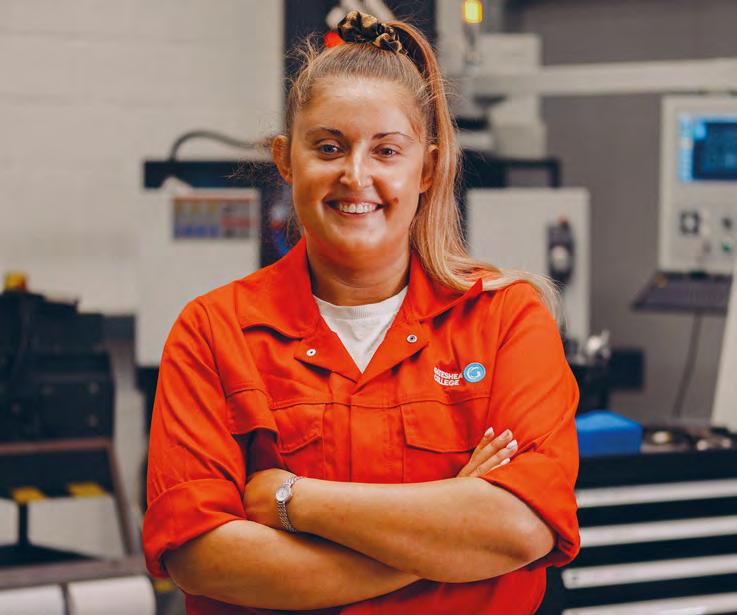
Charlotte is at home here.
She cannot wait to see these machines and computers in action, controlled by 50 new students as they grasp the complexities of the equipment in a range of courses including level three maintenance apprenticeship, level three machining, level three plate welder and level two engineering operative.
She says: “I wanted to see apprentices going into industry with a better set of skills.
“I wanted to pass on my knowledge and my experience.
“A lot of my happiness comes from other people’s happiness; I love helping other people.
“Before I started work, when I was 14, I was doing Duke of Edinburgh, and I worked at Scope, which I absolutely loved.
“I’ve been like that my whole life; any time I can do something to try and help other people, I’ll do it.
“When an apprentice finishes the apprenticeship and they get that achievement, that’s an achievement for me as well, because we’ve worked together.
“And when I go into places like Ford Aerospace, the apprentices who are working there now are still dead excited to see me.
“It’s just nice seeing them growing and seeing the difference they’re making in that company.
“I love it.”
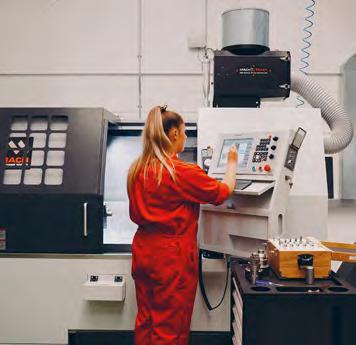
Gateshead College
To learn more about Gateshead College – which is this year celebrating its 80th anniversary – and the courses its provides, visit the website at the top of this article.



Louise Doyle is chief executive of Mesma, the Newcastle-based technology organisation whose software helps education and employment support providers manage quality assurance processes. Here, she tells Steven Hugill about the significance of a recent merger, the value of harnessing data’s true potential and Mesma’s commitment to enabling meaningful, rewarding and accessible careers.
Tell us a little about Mesma and its overarching mission
Mesma is here to take the pain out of quality improvement and turn it into something purposeful.
We work with education and employability providers to diagnose performance, streamline messy processes and create the conditions for sustainable improvement.
Our platform is backed by people who’ve run and inspected provision, so we can offer solutions that work in the real world.
Ultimately, it’s about giving organisations the confidence and clarity to keep raising the bar for the people they serve.
These are exciting times, with Mesma having merged with Kent-based Strategic Development Network (SDN) earlier this summer. You described the move as “an exciting new chapter” for both organisations. What prompted the alliance, and what opportunities does it present?
We’ve worked alongside SDN for many years, with complementary products and services that already benefited clients.
If we were going to merge with anyone, it had to be with a business that shared our philosophy and where ‘doing good’ sits comfortably therein.
SDN holds ‘doing good’ firmly in its mission –and we’ve seen them live that in practice.
We wouldn’t have entertained merging with a business that didn’t.
That said, no matter how well you know each other beforehand, bringing two businesses together is still a big undertaking, owing to the people, systems and processes involved.
The strong relationships we’d already built became the cement that allowed us to tackle those trickier decisions with honesty and openness.
You highlight Mesma’s use of technology. How is the firm’s software used in practice, and how does it help education and employability providers strengthen quality assurance processes?
The platform acts as a diagnostic toolkit, using recognised standards as a reference point, so everyone starts with the same understanding.
From there, we connect those insights to the hands-on support we can provide; we’re not just pointing to problems, we’re helping solve them when an extra pair of hands is needed.
It strips away the complexity from processes that can be time-hungry, without losing the value they bring.
And because the sectors we work in are high stakes, we never lose sight of the human impact behind the work.
Despite data use continuing to rise exponentially, many organisations still struggle to transform statistics into meaningful action. How does Mesma support providers to make smarter decisions?
There’s more data out there than ever, and the sectors we work in operate from data overload.
The real differentiator is knowing which bits matter and how to act on them.
Too often, organisations start with the data they have, rather than the decisions they need to make.
The result is time and energy poured into tracking indicators that don’t move the needle for learners or jobseekers.
The same issue is relevant in other sectors too.
We flip that on its head; we begin with the outcomes our clients care about, then identify the evidence that will help them get there.
It’s a mindset shift from collecting data because you ‘should’, to using it because it’s the fastest route to making the right change at the right time.
We help leaders and quality teams ask the right questions first, spot the story the data is telling and turn that into action that improves delivery.
Our digital tools and sector know-how work hand-in-hand to make sure decisions are grounded in reality.
Can you share any examples of how Mesma has helped clients overcome challenges and improved service delivery?
We’ve worked with hundreds of training providers, colleges, universities and employers where provision was struggling, helping them embed strong governance and quality practices so the whole culture shifts over time.
Seeing their work recognised – whether by Ofsted or through learner or jobseeker success – is hugely rewarding, because we know the effort it takes to turn things around.
I still get emotional seeing clients achieve their goals or turn provision around, because I know how much it matters to them.
Not all our work is regulation-driven, though.
For example, we co-created a sector-led quality improvement framework with the Institute of Employability Professionals and The Good Employability Company.
It’s increasingly used globally to raise standards in employment support – proof that quality done well can ripple far beyond one organisation.
What are your ambitions for Mesma over the coming years?
The creation of SDN Mesma Group is a powerful foundation for UK and international growth.
SDN has deep programme management expertise in the education sector, including large-scale change projects with governmental departments.
Combining that with the Mesma diagnostic platform and consultancy experience gives us huge potential to de-risk scaling.
As founders of the Quality Professionals Awards for Further Education and Employability, we want to extend the reach of the awards and build a body of evidence-based good practice, as an outcome of supporting practitioner-led research projects.
The merger will support this goal, by drawing on the SDN team’s experience of sector action learning projects.
And as an employer, our ambition is to keep building on what we’re already known for –showing that small businesses can create real opportunities for people from all backgrounds in regions we care deeply about, including the North East.
Whether through apprenticeships, industry placements, work experience or internships, we want careers in our group to be meaningful, rewarding and accessible.
That matters to all of us.
Shaping a brighter future
Community Foundation North East www.communityfoundation.org.uk general@communityfoundation.org.uk
LinkedIn: Community Foundation North East
Irene Dorner’s career took her from Whitley Bay to leading HSBC operations across the globe. Now retired, she remains deeply connected to her roots and is determined to give back, supporting Community Foundation North East and its North East Roots Fund. Here, Irene tells Peter Anderson how her Northern upbringing shaped her values and has inspired her to invest in helping others realise their full potential.
Hardworking. Resilient. Honest.
For many, these adjectives epitomise the North East and its people.
And if one individual personifies these values in spades, it is Irene Dorner.
Her remarkable career took her from growing up in Whitley Bay to becoming the first female chief executive of HSBC Malaysia, and, in 2012, being named ‘Most Powerful Woman in Banking’ by New York-based trade publication American Banker, after taking over HSBC’s US operations in 2011.
Now retired and living in London, Irene, who was born in Middlesbrough and moved to Whitley Bay when she was 11, attending what was then the grammar school in the town, is determined to “give back” to the region that she still regards home.
A fundamental part of that is her support for Community Foundation North East.
“One of my proudest moments was when HSBC’s building in Hong Kong lit up with rainbow colours in recognition of LGBTQ+ employees; it was a real statement of support”
Irene, who went on to study law at St Anne’s College, Oxford, before being called to the bar at Middle Temple and then embarking on her career at Midland Bank and HSBC, has always attributed much of her success and “inner drive” to her upbringing.
She says: “I wasn’t from a rich family; my mum was a nurse and my dad was a salesman. “Yet even though we did not have much money,
we had lots of love and encouragement to do well at school, get involved in sport and participate in the community.
“I was fortunate to be very well taught in Whitley Bay and went on to Oxford.
“I feel very fortunate that coming from the North East made all of that possible, providing me with opportunities that I never took for granted.”
Irene says her “Northern values” have always held her in good stead, including her willingness to “ruffle a few feathers” when required.
She says: “I tend to be quite plain-speaking, honest and direct, which I think comes from my Northern roots.
“People know they can ask me to speak truth to power, and I hope I’ve always done that in a fair and straightforward way.
“My upbringing shaped my values – helping people, being fair, standing up for what’s right, even when it takes courage or resilience.
“It has also given me inner drive, an appreciation for what you have and a strong work ethic.
“And there’s a warmth and politeness in the North that stays with you too.
“You learn respect and a sense of fairness and decency.”
Nothing exemplifies that more than when Irene reflects on her career.
Far from any personal accolade, she says her proudest achievement is helping pioneer an LGBTQ+ movement within HSBC, culminating in 2016 with the installation of two rainbowpainted lion statues – called Stephen and Stitt –outside the bank’s Hong Kong headquarters, a moment that still makes her feel emotional.
She says: “I always believed the biggest pleasure in my career came from helping people develop and thrive, rather than the bottom line or share price.
“If you help people achieve their full potential
and create an environment where they can succeed, the profits and customers will take care of themselves.
“That was always what gave me the most satisfaction in my career.
“I was quite invested in diversity initiatives, particularly supporting my LGBTQ+ colleagues.
“One of my proudest moments was when HSBC’s building in Hong Kong lit up with rainbow colours in recognition of LGBTQ+ employees; it was a real statement of support.”
And while Irene’s career took her around the world, her enduring attachment to the North East remains undimmed.
She says: “Even though many of my friends now live in London, there’s always a pull back to the North East.
“When I travel back, I usually go by train from London, and every time I cross the Tyne, I feel a special, almost unique, sense of coming home.
“As soon as the train nears Newcastle, I stand to take in the view across the river, seeing the
bridges, the football stadium, the Baltic – it will always feel like home.”
It is for this reason that Irene, and her late husband Jack, reached out to Community Foundation North East to offer their support.
For more than 35 years, it has worked with individuals, families and businesses to direct funding and resources to charities and grassroots organisations, ensuring donations make a meaningful and lasting impact.
One of its new initiatives is the North East Roots Fund, designed to engage expats and former residents who have found success elsewhere – the “North East diaspora,” as Irene calls them – and encourage them to give back, not only through financial contributions, but also by sharing their time, expertise and professional networks.
By connecting donors with local projects that match their interests, the initiative allows them to have a direct and tangible impact, something Irene describes as a way of “paying forward” the opportunities her North East upbringing gave her.

“As soon as the train nears Newcastle, I stand to take in the view across the river, seeing the bridges, the football stadium, the Baltic – it will always feel like home”
She says: “When my husband and I retired, we were looking for ways to give back.
“I discovered the foundation as a way to make a real difference.
“I was particularly interested in numeracy and girls’ education, and my husband in music.
“We could choose areas that mattered to us and see the impact our support would have.”
She adds: “I want to help young people have the opportunities I was lucky to have, so they can realise their full potential, and the North East Roots Fund is a brilliant idea.
“It is about keeping talent in the region, supporting local projects and using our experience and resources to create lasting change.
“My hope is that those of us from the diaspora can create real opportunities, so that talented young people can stay, thrive and help shape an even brighter future for the North East.”
Community Foundation North East
To find out more about Community Foundation North East, its work and how you could support the North East Roots Fund, visit the website or contact the email address at the top of this article.


Donna Bulmer, regional managing partner of S&W, has steered the Newcastle team through a period of significant change. Over the past year, the firm has undergone a series of transitions, including rebranding and joining one of the UK’s top ten accountancy firms. Throughout it all, Donna has prioritised stability and continuity for both clients and staff. Here, Peter Anderson sits down with Donna to discuss how the firm is balancing its local roots with the advantages of being part of a national network – and how this is shaping its strategy to support businesses across the North East.
Just beyond Newcastle’s medieval keep lies the tucked-away Queen’s Lane, leading to The Long Stairs that were made famous by Michael Caine in Get Carter.
At their summit sits S&W’s main Newcastle office, nestled beneath the striking Turnbull building, providing audit, tax, restructuring and personal advisory services to businesses and entrepreneurs across the North East.
Like anyone who has tackled The Long Stairs, the past 12 months have been a tough, but ultimately rewarding, climb for Donna and her team.
In August 2024, the long-standing Haines Watts office, which Donna joined as a graduate from university, became part of Evelyn Partners.
Then, just months later in March 2025, S&W was launched as a new independent accountancy and advisory business after formally separating from Evelyn Partners with backing from Apax Partners – building on the firm’s heritage but with a clear signal to a new, well invested, client-focused organisation at the forefront of providing the highest quality advice.
For Donna, who has led the Newcastle team since 2014, the journey has required careful stewardship to ensure stability for both clients and staff.
She says: “It’s been a big change for us and for our clients.
“When you go through a rebrand and a change of ownership, people naturally have questions.
“The most important thing for me was making sure clients knew that while the name on the
door was changing, the people they trust and the service they rely on would remain the same.”
That reassurance has been central to the transition.
“It’s about clear, consistent communication,” says Donna.
She adds: “We’ve had to make sure clients understand the reasons for the change and what it means for them, and that ultimately it is about giving them more – more services, more expertise and more support.”
The feedback and response from clients, Donna says, has been “overwhelmingly positive”. She says: “Clients appreciate the enhanced range of services and resources now available through S&W’s national network.
“They are seeing real benefits from the greater depth of expertise and technology we bring to the table.
“Many have told us they’re excited about the new opportunities this move opens up for their businesses.”
Behind the scenes, aligning systems, processes and teams has proved no small task.
Donna says: “There’s a lot to think about when you are bringing together different cultures and ways of working.
“But we’ve come through it stronger, with a clear identity and the backing of a national network that shares our commitment to the region.”
And for Donna, the benefits of being part of a
national network of 16 offices, including two in Newcastle – with the other on the city’s Collingwood Street – are obvious.
She says: “Being part of a top ten national firm means we are connected to specialists across the UK.
“If a client here needs sector-specific advice or access to a particular expertise, I can pick up the phone and bring in the right person straightaway.
“That kind of reach just wasn’t possible before.”
S&W has also invested heavily in new technology and systems, while its national network offers numerous possibilities in terms of staff recruitment and mobility.
Donna says: “We’ve already had significant investment in our systems.
“That’s helping us work more efficiently, share information securely with clients and make the best use of data in our decision-making.
“It also means our people can collaborate seamlessly with colleagues, whether they are in London, Manchester or Leeds.
“This connectivity enhances our ability to respond quickly to client needs and provide comprehensive advice.
“We’ve also had people spending time in other S&W offices, and specialists from other regions coming to work with us here too.
“That cross-migration of talent is great for professional development and broadening our perspective on client challenges.”
Yet you only need to venture to the ground


floor of the Queen’s Lane office to see the giant mural that adorns one of the walls, complete with Alan Shearer, the Tyne Bridge, Jack Carter himself and Ant & Dec to realise that while S&W is a London-headquartered national firm, its Newcastle team will remain firmly rooted in the region it serves.
Donna says: “We’re not here to be just an outpost or a satellite office.
“Newcastle is a vital part of S&W’s national network, with its own identity, voice and influence.
“We’ve kept the personal touch, but now it’s backed by the resources of a much larger firm.
“That’s a really powerful combination for both our people and our clients.
“We can now offer clients the best of both worlds: local knowledge combined with national reach.”
Those clients are facing a complex and challenging business landscape, especially since last year’s Autumn Budget and the hike in employer national insurance contributions.
Those changes have intensified pressure on businesses in the North East, which were already grappling with rising costs, cashflow difficulties, regulatory changes and wider geo-political concerns.
Donna highlights a recent survey by S&W, which revealed cashflow remains the top concern for many companies in the region.
She says: “The North East is a vibrant, entrepreneurial region.
“But every business, from start-ups to established names, is under pressure at the moment.
“Our survey showed that, above all else, small businesses are worried about managing their day-to-day cashflow.
“This isn’t surprising given the economic environment, but it underscores the urgent need for practical, tailored advice.”
While Donna welcomes Westminster’s recent Small Business Plan as “a step in the right direction,” saying it “shows the Government understands some of the hurdles businesses face,” she says the economic climate will remain difficult for the foreseeable future.
And that’s where S&W comes in.
Donna says: “We don’t just provide numbers or generic guidance.
“We work alongside clients to manage cashflow, anticipate challenges and find growth opportunities, helping them build resilience and the ability to adapt.
“Whether it’s restructuring, identifying new opportunities or managing risk, we aim to be a trusted partner through uncertain times.”
And while the team’s list of services and specialisms is extensive, it is set to grow under the S&W banner.
Donna says: “We offer everything from tax planning and compliance to growth strategy, funding advice and digital transformation.
“Our team’s deep understanding of the North East means we can provide solutions that fit both the regional market and the wider national context.
“Being part of S&W will allow us to continually broaden the range of specialist advice we can offer, ensuring we stay ahead of client needs and market changes.”
Looking to the future, Donna is optimistic about the Newcastle team’s role within S&W.
She says: “In the short term, our focus is on consolidating the transition and ensuring clients experience seamless service throughout.
“Moving forward, we want to expand our team in Newcastle and attract talented professionals who share our commitment to client service and regional expertise.
“Our aim is to deepen our roots in the North East, support the local economy and play a significant role in S&W’s wider growth plans.
“It’s an exciting time, and we’re ready to help our clients build stronger futures.”

S&W
For more information about S&W and how its services could help your business, visit the website at the top of this article or call 0191 269 9960.
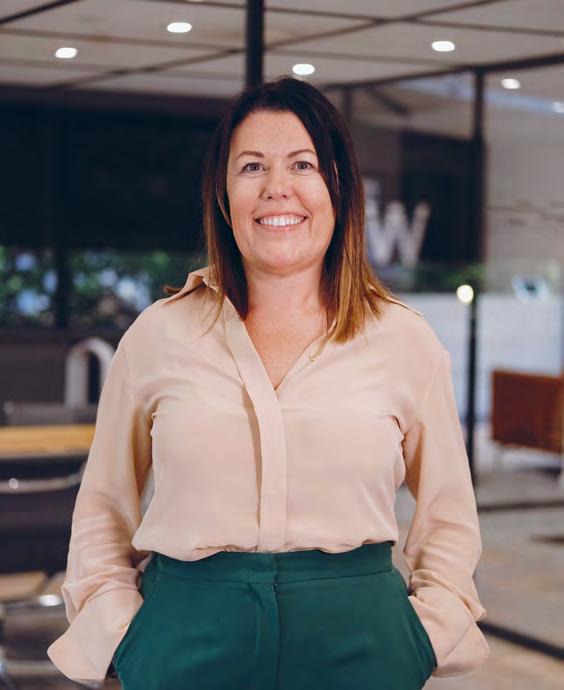
Riding a new wave of innovation
Northumbrian Water Group www.nwl.co.uk/ @nwater_care
Northumbrian Water Group’s Innovation Festival returned over the summer, shining a spotlight on the latest groundbreaking ideas aimed at shaping a more sustainable future. Here, the firm reflects on the success of its latest event and highlights some of the concepts that impressed.
As the summer draws to a close, so too does festival season.
But not necessarily for Northumbrian Water.
When you think about festivals like Glastonbury, Download or Creamfields, the lights go down on the evening of the last act, the guitars stop playing and the wellies are stored away for another year.
However, when the curtain closes on Northumbrian Water’s Innovation Festival, the excitement only starts to begin.
The Newcastle-based event, which has grown exponentially since its humble beginnings in 2016, sees thousands of global innovators coming together for a week of idea-generation in order to help change the world.
It sounds like a bold statement, but it is true.
Since the first event, more than 300 potential
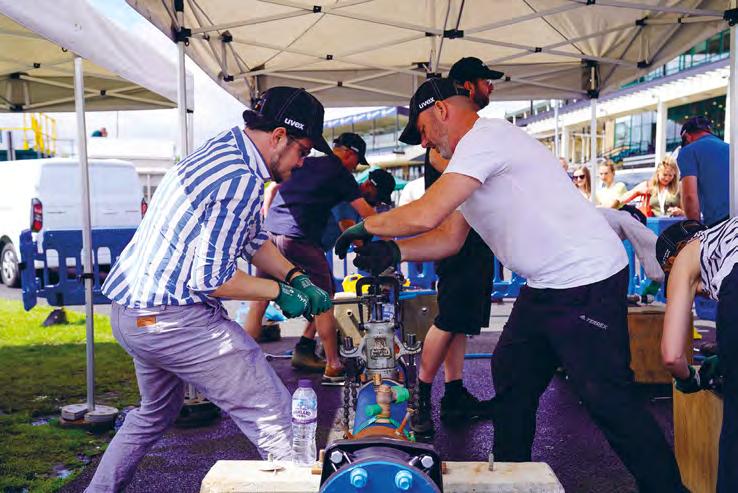
inventions have been created – and are actively revolutionising the utilities sector and beyond.
For example, the National Underground Asset Register, which was founded at the 2017 event, has now been adopted by the Government, is keeping workers safe from fatal utility strikes and is set to lead to £400 million of economic growth per annum.
The 2025 event, held at Newcastle Racecourse in July, saw some incredible ideas emerging – from an artificial intelligencegenerated expert in your pocket to a Vintedstyle marketplace for buying and selling land.
It is believed the top ten ideas from 2025 could have a potential value of £68 million per year and will contribute to improvements in efficiency, infrastructure and economies – all while helping to protect the local environment.
At its core, the Innovation Festival is a series of problem-solving design sprints where ideas can flow freely and organically, with celebrity guests and fun activities thrown in for good measure.
And the ninth annual Innovation Festival saw 39 countries, 500 organisations and 45 sectors coming together to embrace the most sustainable event yet under the theme of regeneration.
From biodegradable glitter and 3000 reusable coffee cups, to a fully hydrogen-powered event, sustainability was at the core from the inside out.
The top ten ideas from Innovation Festival 2025:
HAPI – Trading biodiversity for a better planet
Imagine a digital marketplace where organisations can buy, sell and suggest land
use for environmental benefit.
HAPI (Habitat and Property Investment) is designed to do just that, helping to manage biodiversity better by streamlining investment decisions, cutting red tape and accelerating progress towards a greener future.
Like Vinted – but for the environment!
Build it – Smarter planning for better communities
Local councils and planners often juggle (and struggle using) outdated planning systems.
‘Build it’ is a project to create a one-stop digital platform for planning infrastructure, housing and environmental goals.
This will enable more informed, transparent, quicker and joined up decision-making that truly benefits local communities.
Ingress-Ception – Tackling unwanted flow and flooding
Unwanted water, such as road run-off and groundwater, entering the network is a growing problem.
This handy idea will use a visual data platform to help manage water flow, and will also use a behaviour change method to help communities understand water-related issues.
Total Recall – The artificial intelligence that answers your site questions
Total Recall is like having an expert on hand 24/7.
It is an artificial intelligence chatbot loaded with all the knowledge, history, data and information from a company, helping teams in the field make smart and informed decisions by providing relevant answers and pointing to additional information when needed – all in real-time.
Smart Sewer 2.0 – Reimagining wastewater systems
This project uses a single pane of glass interface, similar to a super-high-tech iPhone screen, to manage sewer systems with high efficiency.
It will allow teams to respond more quickly, use data more effectively and will significantly lower costs – all while reducing risk to the environment.
H2OH – Turning waste into clean energy
H2OH is turning wastewater treatment sites into clean energy hubs by converting waste gases they produce into hydrogen or other green fuels.
Think power from poo but at every site; it helps the environment and reduces the company’s energy use.
Asset Risk Register – Know your infrastructure
This digital register helps engineers and


decision-makers see which assets are most at risk, so they know where to focus.
It gives a clearer view of infrastructure health, supporting safer and smarter investments.
ARC (Circular Economy) – Reuse, regenerate, reimagine
Think Facebook marketplace, but instead of old furniture being advertised, ARC is all about giving unused materials, such as pipes, parts and equipment, a new life, boosting circular economy efforts across the water sector.
Storming for Efficiency – Greener stormwater solutions
This project will give a greener upgrade to underground stormwater storage by using big crate tanks that are specially designed to be low-carbon and sustainable.
Spill Intelligence – Smart response to spills
By combining smart sensors with data already gathered in company systems, this project enables a quicker, more targeted response to wastewater spills, helping to protect the region’s rivers and seas.
It builds trust with customers and regulators, while helping shape the future of wastewater.
Angela MacOscar, head of innovation at
Northumbrian Water Group, says: “This year’s Innovation Festival generated a lot of valuable ideas, and we are incredibly proud this level of high-quality innovation is happening in the North East.
“A lot of these projects are UK or world firsts, and it just shows that here in the region we’re thinking big, acting boldly and placing regeneration at the heart of everything we do.
“We’re excited to be leading the way when it comes to new ideas and technologies that will help to protect the environment in our region.”
Northumbrian Water Group
For more information about Northumbrian Water Group, the Innovation Festival and the services provided by the organisation, visit the website at the top of this article.

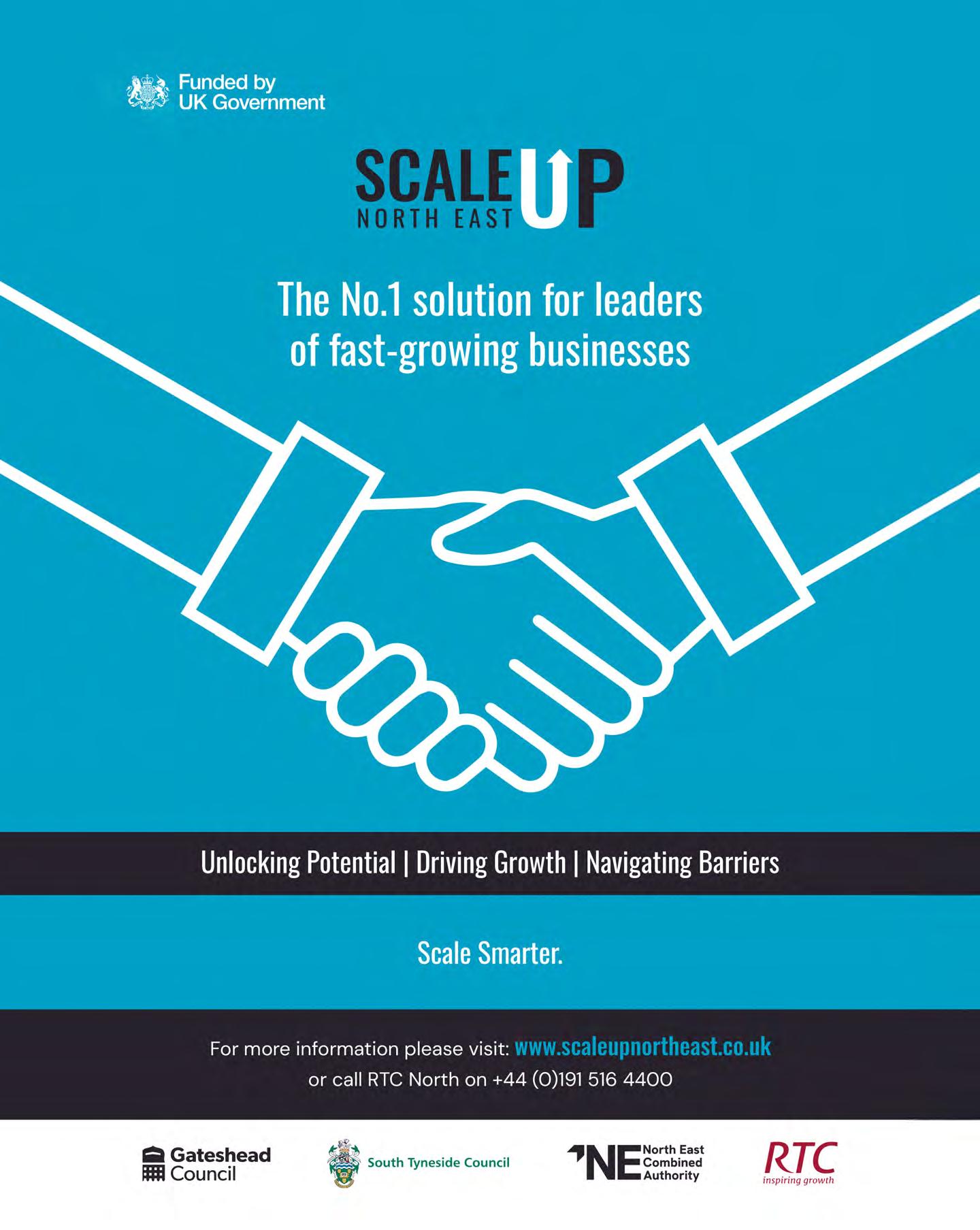

OFFICE OUT OF
In the latest instalment of a series exploring businesspeople’s lives beyond the workplace, Steven Hugill speaks to Mark Brassell, chief executive at The Alnwick Garden, which, under his stewardship, has seen annual visitor numbers rise beyond 600,000 thanks to attractions including the popular Lilidorei fairytale play village. Here, the Ashingtonian, who spent his formative years in South Africa, talks about his passion for hiking and mountaineering – which has taken him to places including Everest Base Camp – how sport informs his leadership skills and why life should always be a journey of improvement.

www.alnwickgarden.com
Instagram: alnwickgarden
Away from your role as chief executive at The Alnwick Garden, you are very active, with hiking and mountaineering pursuits complemented by further sporting endeavours. What sparked your hunger for being outdoors?
I have always been passionate about hiking and mountaineering, and used to lead hikes for a club when I lived in South Africa.
After moving back to the North East in 2015, I became part of the Tillside cricket team and I also play tennis for Berwick Tennis Club, which plays in the Scottish League, so that keeps me busy and active in my spare time.
As a family, we are very sporty.
My wife and children have always been keen hikers and together we have climbed Ben Nevis (even when two of the children were under six-years-old); Scafell Pike; a mountain range while on holiday in Turkey; and the stunning Drakensberg Amphitheatre mountain in South Africa.
We have recently bought a motorhome, with a plan to travel around Europe and discover more mountains and hikes.
Any hike must mark a special – and stamina-sapping –experience. But do you have a favourite trek among your scrapbook of climbs?
My favourite hike has to be the Drakensberg mountain range, in South Africa.
At 3000 metres, it’s steep, spectacular and physically demanding.
The final ascent involves a ladder – but at that height, the weather can turn quickly. It’s a real test of endurance.
Everest Base Camp, which I completed a few years ago, was also a highlight.
We avoided the tourist trails and explored remote areas with a hiking group.
The scenery was breathtaking; it was an unforgettable experience.
The parallels between sport and business are very close, with one often helping influence the other. How does sport inform your leadership?
My competitive spirit and team-first mindset are deeply woven into my leadership style.
I love to keep learning and improving, which mirrors the ethos of team sports.
It is all about striving together, working as a team, learning constantly and celebrating shared successes for the end goal.
What impact does sport have on your life beyond the office?
Being part of rural, family-oriented cricket and tennis clubs gives me a wider circle of friends and perspectives.
Playing in a team helps me switch off from work and return refreshed and more present for my team at the office.
If you could pull on your hiking boots with a famous person – past or present – who would it be and why?
I’d love to climb a mountain with Barack Obama, as I’ve always looked up to him.
He seems like a decent man with similar morals to me, and I admired his leadership skills when he was in office.
And Nelson Mandela. He was such an inspirational man and someone I’ve always really admired as a humanist.
With your sporting passions in mind, what advice would you give to others in a senior business role?
Stress comes with the territory, but staying active is essential. It clears your head, calms your body and helps you lead better.
At The Alnwick Garden, we encourage that ethos, and with such beautiful surroundings, even a walk around at work can be restorative.
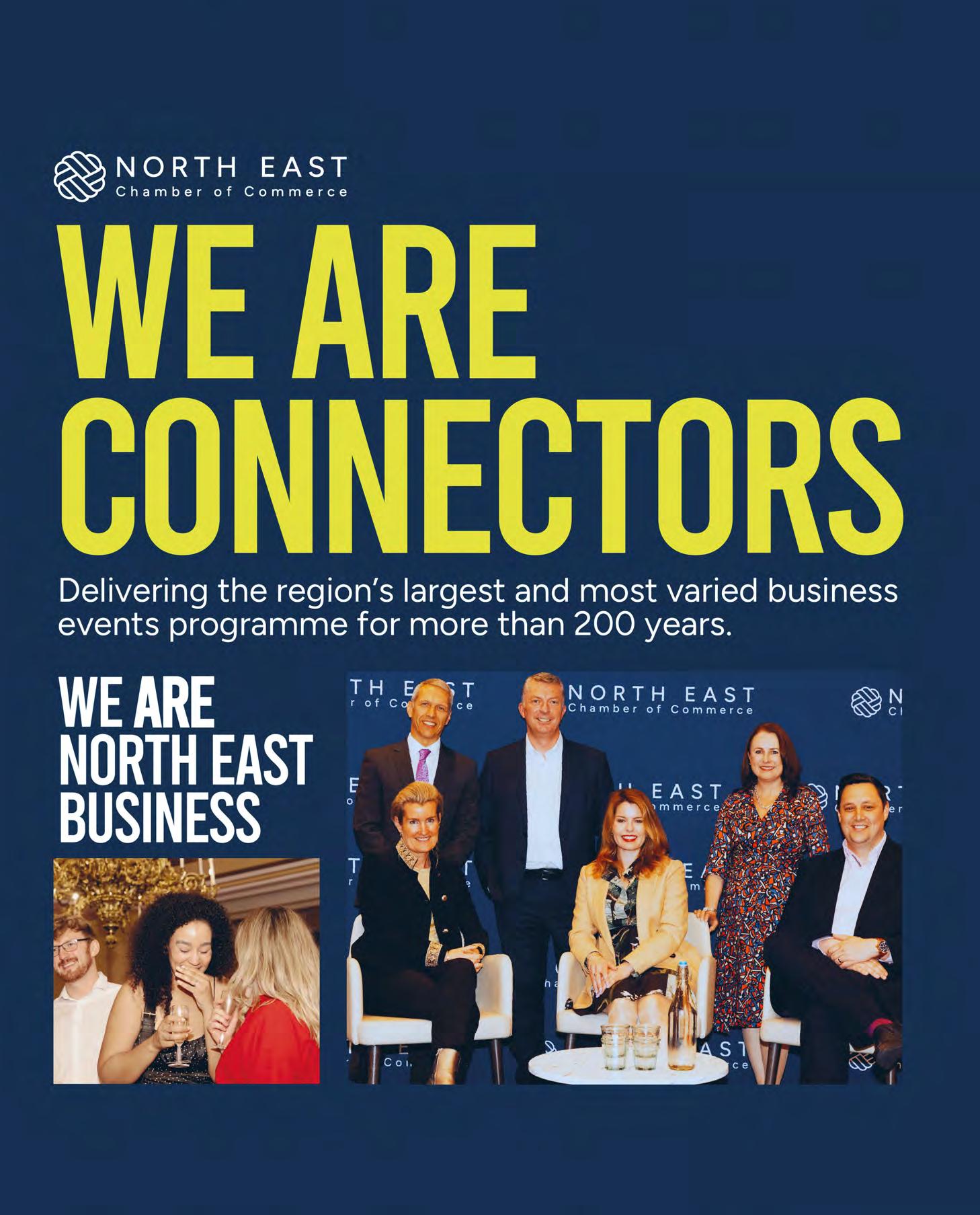


FOZIA
THE WORMS THAT TURNED
www.magnitudebiosciences.com
LinkedIn: Magnitude Biosciences Ltd
Durham University spin-out Magnitude Biosciences has secured funding worth nearly £1 million in the last year to accelerate revolutionary research into the ageing process and other significant medical advances. And all from minuscule worms created in a shed. Here, chief executive Fozia Saleem tells Colin Young more about the company’s growth blueprint, getting to grips with its scientific complexities and how it is taking worms to the world.
Allow me to talk to you in crayon…
Because that’s how Dr Fozia Saleem found herself selling worms – and the trademarked WormGazer – and promoting their benefits to the world of medical science, research and development from County Durham.
Fozia is Magnitude Biosciences’ chief executive, hired by the company three years ago to lead product development, delivery, growth and profits.
The firm is a drug development research organisation based at Business Durham’s NETPark science and technology hub near Sedgefield, and concentrates on life sciences, neurodegenerative diseases and healthy ageing solutions.
A Durham University spin-out, it has developed the imaging technology WormGazer to utilise the C. elegans worms and lead research and essential data for new drug therapy development.
C. elegans exist naturally, but have been used as models for studying age-related diseases for nearly 50 years.
The worm population at Magnitude has been growing for more than a decade, so they can create their own human disease variants for tests.
Fozia has a PhD in molecular physiology from the University of Edinburgh and a distinguished 15-year career with senior leadership experience across the medical, pharmaceutical and nicotine industries with the likes of GlaxoSmithKline, British American Tobacco and Broughton Life Sciences.
She visited Magnitude looking for a new challenge, on the recommendation of finance house Northstar Ventures, and met founders Dr Chris Saunter and Professor David Weinkove.
And she was immediately blinded by their science.
Fozia says: “I remember Alex Buchan, from Northstar Ventures, asking me if I was still interested in an opportunity in the North East because he had a portfolio company that could do with some help.
“I said yes, and he told me, ‘it’s good that you
have a science PhD background because you’ll need to be able to talk science with the two founders.
“I came down on a Friday afternoon – those afternoons are quite creative and busy because of the lifecycle of the worms, and it was lovely to visit in the middle of all that energy.
“Chris took me to the ‘Man Cave Rooms’, where all the tech and magic happens.
“I only had about two-and-a-half hours, and Chris talked almost non-stop about the technology and science.
“He was saying it all in physics-speak, and while I’ve got a PhD, I’ve basically been in management my entire career.
“A lot of the stuff he was saying was going way over my head.
“I was trying to get to know him well enough to turn around and eventually say, ‘Chris, explain it in crayon!’
“I said, ‘talk to me in crayon, and I’ll get you, I promise; I will follow you, but I’m not as smart as you, and I don’t get it as fast as you’.
“I remember he was so enthusiastic and really passionate about the tech – it was actually really cute.
“He knew it inside out, and he believed in it too. That’s what pulled me in.”
When Fozia joined Magnitude, the company employed seven people.
Today, there are 22, and the work is piling up.
Fozia says: “Chris and David are so clever and so smart.
“They’re responsible for all the company patents, the technology and the science.
“The foundation of the expertise comes from them.
“But they’re academics that didn’t have the background on how to scale-up and commercialise it.
“They did a fantastic job before I joined, and got close to £500,000 revenue, which we’ve grown since, and they did that through their own mettle without any commercial expertise.


“Chris knew the science inside out, and he believed in it too; that’s what pulled me in”

MAGNITUDE

“I was brought in for the scale-up side of it, and that’s what we’re now aiming to execute.”
Magnitude weathered the early days of development in Chris’ garden shed, before moving into the university labs; survived COVID-19 lockdowns and the dangers of moving an entire lab across County Durham in seven trips in a family estate car; and secured vital funding from British Business Bank as interest in its WormGazer technology increased.
And as NETPark continues to expand with new buildings, Magnitude is also looking to grow from its current base on the site.
For now, in a small contained laboratory, PhD student Chad Yanyatan quietly shows off a fresh batch of tiny worms.
Chad, who originates from Kean University in New Jersey, is one of 12 students on the Marie Curie European fellowship, as part of the NervSpan consortium that Magnitude belongs to, which aims to train young researchers in neurobiology using the nematode C. elegans as a model organism.
The tray on which they wriggle is the size of a pack of cards.
On it, there are around 60 small, liquid-filled holes which, to the human eye, look docile and inactive.
They are placed in the WormGazer and, when Chad positions the microscope to look deep into the holes, these circles and creatures come to life.
The worms flit and flicker across the screen and perform one last dance before they are incubated and stored.
The plan now is to increase the scale of these experiments.
Fozia says: “The industry has used various different models to mimic age-related diseases and bring these products to market; worms are the best model.
BIOSCIENCES


“Early drug discovery tests have always been done on just cells – but with the worms, you can start to understand a whole lifecycle”
“If you try to do the same experiment with mice, it would take more than two years.
“With worms, you can speed up the process and do it in weeks.
“We’re a hell of a lot faster and a hell of a lot cheaper.
“I always say, if I’m trying to explain what we do, that we help researchers fail fast and fail cheaply.
“If the drugs are not going to work, you fail much earlier and you can avoid failing in clinical research; if you fail in clinic, you’ve wasted millions.
“But if you fail a lot earlier in the drug discovery pipeline, you screen out your false positives, because this is the first time you get whole organism data.
“You have to remember, this is a full, living, breathing organism.
“It’s having hundreds of babies a week; it’s got a full physiology; it has 80 per cent genetic homology with humans, so it is translatable.
“Early drug discovery tests have always been done on just cells – that’s a 2D model.
“It’s not interactive, there are no reproductive organs, no muscles, no guts, none of that stuff.
“With the worms, you’re getting the whole organism; it’s multiple progeny and you can start to understand a whole lifecycle.
“If this drug starts to impact on this tiny worm, maybe it will work on its babies and future generations as well.”
Fozia recently stepped back from her role as vice-chair of the Newcastle arm of The Lifted Project – the national organisation helping
female founders gain access to muchneeded growth funding – to concentrate on Magnitude’s expansion.
This year has seen increased investment in the firm, which has allowed the scientists in the building to increase the efficiency and spend of their work and research.
Maven Capital Partners, Northstar Ventures and Innovate UK have ploughed £706,000 into the endeavour.
And while Fozia continues to engage with the outside world through her own version of crayon talk, the hard work continues in the labs, where they are testing compounds faster and cheaper than traditional methods.
It will potentially save millions in clinical trials.
She adds: “The team can do the science, make the magic happen and file the patents – I’m the one trying to make sure we’ve got enough money, we’ve got the right strategy and we’re getting the right clients.
“If we have magic like this, how are we communicating it? How are we telling people? That’s the next task.
“The fact we managed to get to high throughput scale-up within six months is incredible.
“I’ve worked in commercial, corporate pharmaceutical companies – we were never able to get this far, this fast.
“That Chris, Dave and the team have pulled this together is extraordinary.
“It’s been a real team effort to make it happen.
“And what happens next is going to be so exciting.”
LAST WORD
Closing this edition of N magazine, Lesley Spuhler, chief executive of the Foundation of Light – Sunderland AFC’s official charity – reflects on nearly 25 years of using football to change lives, how the club’s Premier League return can boost the organisation’s impact as it rolls out a new five-year strategy and its commitment to growing female participation in the game.
www.foundationoflight.co.uk
LinkedIn: Foundation of Light (SAFC)
Sunderland AFC’s Premier League return has generated a huge buzz across Wearside. How can the Foundation of Light harness the positivity –and increased spotlight – on the club to further boost its impact?
The Premier League is a global stage, but its impact will be felt deeply in our local communities.
It will inspire a new generation of Sunderland supporters, and we’ll continue to work hard to channel that energy into our programmes in schools and communities across the city and the wider region.
We’ve always known how powerful the Sunderland badge can be and now, with the spotlight on us like never before, we have even greater potential to deliver life-changing opportunities to thousands of people and reach further to drive positive change.
The community influence to which you refer includes a dedicated focus on female participation. How is the charity – and its Beacon of Light hub –helping more women and girls get into the game?
It’s not just the men’s team bringing people into the Beacon of Light.
As well as welcoming Jill Scott to the board of trustees, a particular strength has been the growth of our Female Football Pathway.
That now engages with more than 500 participants, reflecting the increasing role of women and girls in sport.
As the charity looks forward to its 25th anniversary, what are the aims for the next quarter of a century?
We will shortly be announcing our five-year strategy for 2025-2030, to build on our successes at the Beacon of Light, which remains the beating heart of our work.
It serves as a hub for programmes and a space for the community; The Beacon is a lifeline for so many people.
This year, we’ve worked with more than 23,000 individuals across 50 programmes, spanning education, employability, health and sport, and we have upskilled more than 1500 young people and adults through our employability programmes, helping secure jobs for hundreds.
And our partnerships with Sunderland and Durham universities, the Croda Foundation, Roseline Foundation and all three local authorities have strengthened our ability to deliver meaningful change where it is needed most.
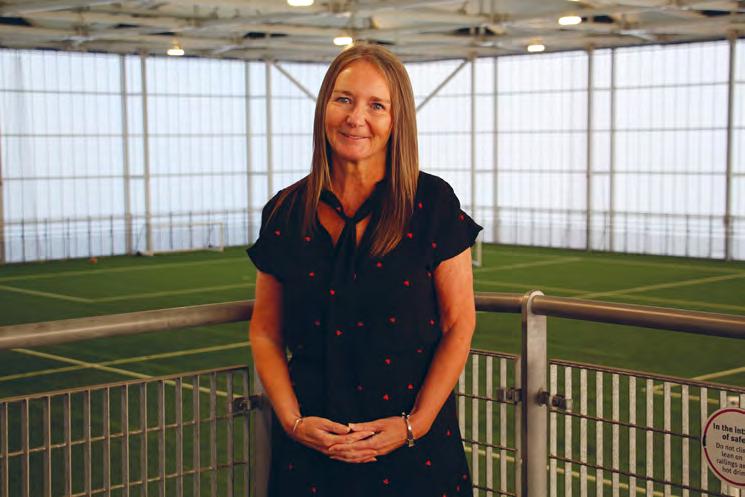
“The Premier League is a global stage, but its impact will be felt deeply in our local communities”


